#like that season was not only affected by very questionable storytelling decisions
Text
i'll forever wish that hsmtmts was one of those shows that got 22 episodes a season so every character and plotline could've been given the proper treatment they deserved. like yeah it's a lot for the premise it had, but more episodes would've meant delving more into their backgrounds or giving more development into friendships and relationships of the show. i'm also still kind of mad that the season that was arguably their weakest ended up with the most episodes, while their stronger seasons had a limited number of episodes.
#season 2 did not deserve that 12 i don't know what disney was thinking#like that season was not only affected by very questionable storytelling decisions#but it was obviously their season the most impacted by covid and the cut storylines and adjustments they had to make showed unfortunately#plus more episodes would've given us a chance to see more into the character's home lives earlier than we got to#things like carlos being rich were never really touched on again#it would've been nice to be introduced to kourtney's family earlier and she deserved more episodes centered on her#even ship wise i'm glad it took 31 episodes before rina got together but we could've had so much more time#this is nitpicky and i was just thinking about how disappointed i was with season 2#and also people talking more about the characterization in season 4 from some of the ensemble so i just got ranty again lol#hsmtmts#high school musical the musical the series#gina porter#ricky bowen#ashlyn moon caswell#hsmtmts maddox#hsmtmts jet#nini salazar roberts#big red#carlos rodriguez#seb matthew smith#miss jenn#kourtney greene#useryay
37 notes
·
View notes
Text
Why the ending of Supernatural is problematic - the meaning of storytelling
Originally, I wanted to write a full essay on this and I still might, but since the university libraries are closed and I have three other big writing projects at hand, one of which is my final thesis, this might take a while. I still want to share my thoughts about this. A lot of this has been said before, but not yet by everyone. Trigger warning for mentions of suicide and homophobia.
The thing that bugs me most about the whole discussion about the ending of Supernatural is people saying “why do you care so much? It´s just a story.” Storytelling has been a part of human culture for thousands of years, it is something that everyone does and to think that telling stories doesn´t have a function in society that goes beyond entertainment is just plain wrong. Every part of storytelling, be it the actions shown, the words used, the characters involved or the connotations connected with any of the above, have the power to influence the way that the recipients of the story perceive reality. Now let that sink in for a moment.
To borrow some words from a text about gendered narration: “Narration is understood as a cultural practice that spans genres and media and it is of great significance for gender constructions and gender relations, because stories don´t simply reflect on the perception or imagination of ´gender´, but they create them. From this perspective, storytelling seems to be one of the performative acts that produce and establish identities and gender constructs in the first place.” (Nünning/Nünning (2006): Making gendered selves; translated from german). The important thing to take from this quote is the last bit: Storytelling is an act that produces and establishes identities. And from here, we jump directly into the ending of Supernatural.
I don´t think I have to explain a lot about what happens in the last two episodes of Supernatural. But I want to go into the potential impact. So, in the ending of episode 15x18, we see a male presenting character, Castiel, declare his love to another male presenting character, Dean Winchester. It is made very clear, both by the actual show and the comments of Misha Collins, who plays Castiel, right afterwards, that this is in fact meant to be romantic. Right after that scene, Castiel dies. He not only dies by coincidence, but confessing his love is the thing that makes him happy and therefore, because of a deal he made with the empty, is the thing that kills him. It is not explicitly said if Dean loves him back. In the next episode, this confession is never mentioned, but Dean shows some signs of wanting Castiel back desperately (begging Chuck to bring him back, running up the stairs because he thinks that Cas will be there), but these signs just stop at some point during the episode. In the series finale, Castiel is mentioned twice, but not once by Dean and always in a fleeting manner. It never becomes clear if Dean loves him back and life apparently just went on without him. Not to mention that death has never been a permanent or undefeatable state in the show. But Castiel never comes back, his feelings are never mentioned and neither are Dean´s, although it has been clear in previous seasons that he usually takes it very, very hard to lose Castiel, to a point where he becomes reckless and suicidal (see early season 13).
There are a few things to address here, but the main thing for me is that it seems like Castiel loses his status as a friend who will be dearly missed as soon as he comes out as in love with Dean Winchester, which is perceived by the audience as being gay (angelic gender discourse aside). And this is a bad message. It´s a really bad message both for people who struggle with their sexuality and see all their fears come true, and for people who have prejudices about LGBTQI+ people and get the message that they are less valuable as human beings. Which is not true, but again: Storytelling is an act that produces and establishes identities. The death of Castiel was only one of the problematic messages. Dean Winchester, who has been coded and perceived as bisexual and who has been a beacon of light for many who struggle with mental illnesses, dies too. Worse, he basically chooses death, which completely destroys the hopeful message of never giving up. Eileen Leahy, a deaf character who represents a group of people who are seldomly represented in media in a positive and empowering way, disappeares from the narrative, too, without an explanation and takes that empowerment with her. There are more examples, but the general idea is clear.
And this is, for me, the main problem with the Supernatural finale. The ending of Supernatural helps to establish hurtful tropes and assumptions. It transports messages that can be very harmful both for people who identify with those characters and see their own very real and important hopes and dreams fall to pieces, and for people who could use to see good representation of diverse characters to question their own values and opinions.
I hear you asking: “Okay, so bad media representation is bad in an abstract, cultural context. But how big can the impact of such media representation actually be for individual people? And how do you prove that?” So let me ask back: “Have you ever heard of the Werther effect?”
In 1774, Johann Wolfgang von Goethe published the novel “The sorrows of Young Werther”. In this book the main character kills himself after being rejected by the woman he´s in love with. After the novel had been published, a number of young men committed suicide, following the example of the book character Werther. This is not the only case where the depiction of the suicide of a character inspired people who strongly identify themselves with the character commit suicide: “There have been other such “epidemics” [meaning suicides in imitation], such as the rash of suicides in young Jewish females after the publication of Otto Weininger´s Sex and Character in 1903. However, an earlier recorded epidemic occurred in the early 1700s in Japan.” (Krysinka/Lester (2006): Comment on the Werther effect. S.100).
Long story short, it is a known phenomenon that media has a huge influence on the lives of recipients, especially if they can identify strongly with the characters, all the way to existential decisions like suicide. And in the case of Supernatural, that´s an extraordinarily relevant question.
The character Dean Winchester has battled depression, trauma and suicidal thoughts and tendencies in his journey. Many people who battled the same issues could identify themselves with this character, which is a known fact in the fandom and has been said multiple times on conventions and on social media. Showing that this character accepts death, even though it is questionable if that was necessary, and implying that the only way that he can find peace is by dying is highly problematic. Combined with the number of people who identify as LGBTQI+ and who have a strong connection to the character Dean Winchester, and considering the high suicide rate among LGBTQ+ individuals, death as the conclusion of his character arc is a dangerous message.
To summarize my point, storytelling is an insanely powerful instrument to shape the collective social memory of a culture and it has direct influence on how we perceive the world and other humans. Bad media representation causes real life issues and can be very harmful, both on a personal level and in society, for those who are affected. It lets hypocrites, homophobes and racists stay in their bubble of righteousness and fails to call them out on their bullshit. It is a lethal threat to some. Bad media representation and thoughtless storytelling is dangerous. And this is why I care so much. Because it´s not just about a story.
So, that´s it for now. I would love to hear your thoughts about it!
And I send love to all of my mutuals, everyone who loves Supernatural and hates the finale because of it, all of my rainbow siblings and everyone who needs it! <3
#the15yearshow#destiel#eileen leahy#media representation#spn season 15#spn finale#literature textpost#the importance of representation#the sorrows of young werther#meta post#I guess#narratology#storytelling#literature student#supernatural
62 notes
·
View notes
Text
Tangled Salt Marathon - The Alchemist Returns

Strap in folks, cause this is going to be a long one. In truth, there are very few flaws in this episode, but in order to explain them I have to really get into some character analysis first.
Summary: Varian comes to Rapunzel for help in finding the remnants of the mystical golden flower, which may hold the key to stopping the Black Rocks. Working together, they venture through the old tunnels beneath Corona. Meanwhile Cass and Eugene work together to figure out who drugged the castle’s populace with a truth serum.
Behold! The One and Only Time Frederic is Called Out on His BS; and Nothing Comes of It.

Rapunzel finally, finally stands up to her dad and points out both his abusiveness and his poor leadership. It doesn’t affect the narrative in anyway. Neither character learns anything from this nor changes their points of view. This conversation might as well not have happened given how the characters behave in later episodes/seasons.
The only reason this scene exists is to give Rapunzel motivation for stealing the flower within the episode. A goal that she changes her mind about towards the end. Thereby walking back on such motivation and putting us back at square one with her development.
Rapunzel Isn’t Being Truthful With Herself Nor the Audience
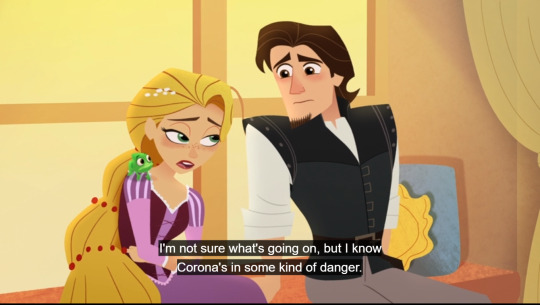

So people aren't always one hundred percent truthful about what they want and their goals. Especially if it involves admitting something about yourself or a loved one that you don’t want to acknowledge. Fictional characters are meant to give the illusion of being real so they can sometimes mimic this behavior.
Throughout the episode Rapunzel keeps on assisting that she’s doing this ‘for Corona’, but we’re given context clues along side that to tell us that her real reasons are about her relationship with her father.
Unfortunately, the show has a bad habit of not communicating information clearly and also has a history of expecting the audience to take what the characters say at face value. Ergo, it’s easy to miss Rapunzel’s true motivations and thereby fail to fully understand her actions and decisions throughout.
Once Again, These Prophetic Dreams Go Nowhere

Dream Varian mentions Rapunzel has a ‘destiny’ but the show never spells out what that destiny actually is nor why she needs to fulfill it. Sure there’s a big quest for the moonstone in season two, but the rocks stop being a threat by then so really, she doesn’t actually need to go on that quest. In fact, she would save a lot of people at lot of trouble if she did nothing at all. That’s poor storytelling. You need something driving the action; a reason to motivate the hero.
Secondly, we never get an explanation for why she randomly has these dreams in the first season but for none of the others. Nor why Varian is at the center of the them when it’s other villains she needs to actually be warned about, like say Zhan Tiri.
No, the real reason why this dream sequence exists is just to reiterate Rapunzel’s internal conflict. She wants a relationship with her Dad, but he’s a male Gothel, and she’s now caught in the middle of his and Varian’s conflict because she failed to take responsibility when she needed to. And is still failing because she doesn’t want to shatter her illusions about Frederic.
Shoving the main protagonist’s driving conflit into a subtextual dream sequence is lazy. Especially since we get no official resolution to said conflict. Rapunzel never acknowledges the problem here, never follows up on any type of action, and she never faces any true consequences for ignoring the issue.
She carries on believing in her fantasy version of Frederic, even as he continues to do harmful things, and the narrative just rewards both her and him for it.
There Should Have Been an Episode Showing the Audience Varian’s Side of the Story
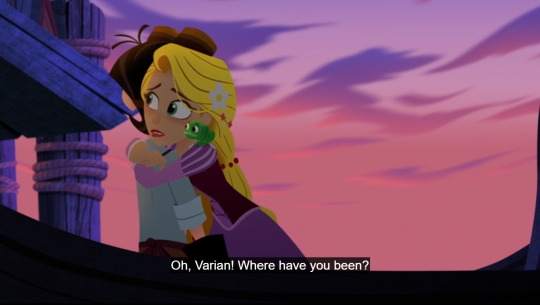
What happened to Varian in between Queen for a Day and this episode is told only through context clues. Nothing is stated outright, meaning the audience has to rely too heavily on inference and are left to piece together what happened on their own like a puzzle. That’s poor writing.
Even something as simple as ‘how much time has past’ (its three months btw, S1 is six months long and QfaD is the meant to be the midpoint) is left up to the viewer to keep up with rather then being clearly stated. This is made even harder to do by the marketing team showing most of the episodes out of order.
You need to clearly relay information to your audience. That means repeating said information in a variety of ways over the course of the story. Have those context clues, but also have more overt hints, and direct reveals interspersed along with that. Especially when dealing with the motivations and goals of the character driving the main plot.
Even if you attribute the lack of a Varain episode to the ‘twist’ in this one, (a twist that was revealed in QfaD anyways) there’s still no excuse for why we didn’t get a flashback episode afterwards to fill this hole in narrative out.
Don’t Pretend Ignorance Rapunzel


Nigel literally repeated the rumor to her face last episode. She knows her father is lying about the rocks and attacked her for the scroll. She knows from the letter that those same guards were chasing down Varian for said scroll. She knows about Corona’s laws and what would happen to Varian if the guards caught him.
There is zero reason for her to be acting like this is new information. Let alone have any right to feign concern after three months of ignoring his plea for help.
That’s what I mean about the series not communicating clearly and wanting the audience to take things at face value. The show deliberately has the characters say things that contradict established events to try and get the audience on their side.
The episode is trying to telling us, ‘See! Rapunzel is innocent in all this cause she didn’t know, but she’s trying to make up for it now’. Yet, if you’ve been watching and paying attention to the details, you know that’s not the truth here.
Good writing is about communicating ideas to your audience. But this show can’t decide on which idea to communicate. Is Rapunzel at fault or no? You can’t have it both ways. Either she screwed up and thereby caused the conflict in question now or she didn’t. If she didn’t, then events shouldn’t progress like they do. If she did, then it needs to be acknowledged and she needs to held accountable by the narrative.
More Hints into Rapunzel's True Motivation
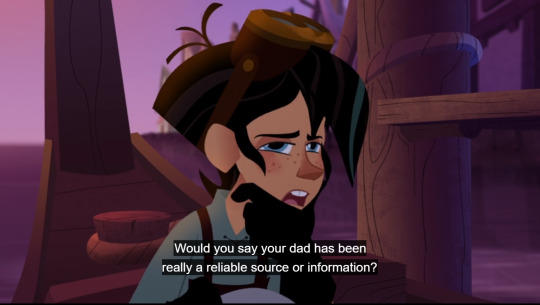

I can’t stress this enough. Rapunzel’s reasons for stealing the flower has nothing to do with Corona. That is an excuse. It’s about trying to find out what her Dad is hiding from her and why he’s lying to her. This comment right here is what compels Raps to go along with his plan.
Also...
Varian Isn’t Lying Here
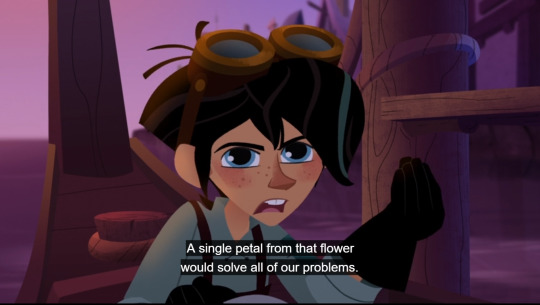
I also want to make it perfectly clear that Varian is being upfront with Raps. He tells her his plan is to steal the flower and why. She’s the one that makes the assumption that this entails them only taking one petal and the assumption that ‘all our problems’ only means saving Corona. Even though saving Corona and saving Quirin are the same problem. (more on this later)
It’s important to understand Rapunzel’s thought process and her true motivations in order to make sense of her actions later in the story.
Rapunzel’s internal conflict is her need for autonomy versus her fear of rejection. The ‘for Corona’ and ‘one petal’ excuses are used because she thinks they’ll play well with her Dad. In order words, they’re reassurances to her that should she get caught and have to face her father’s disapproval then she could counteract his arguments with his own belief system about ‘putting the kingdom’s needs first’ and ‘following your own inner voice.’
And yes, both Rapunzel and Frederic are big fat hypocrites for this, but Rapunzel hasn’t acknowledged that fact to herself and is trying to convince herself throughout the episode to believe in her own excuses.
Why Do You Care About Treason Rapunzel?
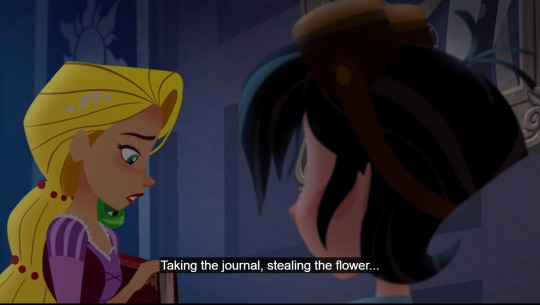

For context, treason is the highest crime in any country. It’s punishable by death, even in the real world. Now each country has its own legal definition of what constitutes as treason. Here in a America, in Article III, Section 3 of the United States Constitution, treason is specifically limited to levying war against the US, or adhering to their enemies, giving them aid and comfort. And only during a time of war. Legally, a time of war has to be approved by the US congress. Technically, congress hasn’t declared war since World War II. This is why certain people haven’t been convicted of treason like acts both in, and out of, later US conflicts because the definition is arguably too narrow and specific. But it’s intentionally that way to help prevent false accusations and to keep people in power from murdering their political opposition.
Before the US, treason just meant opposing the ruler of the land in any way. The founding fathers committed treason just by signing the Declaration of Independence. They all would have been executed had the US lost the revolution. Here in Corona, that old definition still stands. Simple theft of royal property, a non violent act, is considered treason and we already know it’s punishment. Eugene stole royal property and was almost hanged for it in the movie.
Now Rapunzel though, she is royalty. This stuff she’s stealing is technically her own property. She’ll inherit all of these things once Queen. Moreover, we all know that Frederic wouldn’t harm Rapunzel let alone kill her. She’s not in any real danger here. So why does she care?
Remember that Rapunzel’s internal conflict is personal autonomy versus her fear of rejection. She only hesitates in her pursuit of answers when reminded of Frederic’s possible disapproval. That’s why she stops under his frowning picture to say this. “Treason” only means possible rejection or disapproval from her father. The worst thing she faces is another argument with him.
Meanwhile, Varian’s life is very much at stake here. He is risking everything, quite literally, to save his father. But his life was arguably forfeit as soon as Frederic decided he wanted the scroll. What’s to prevent the king from claiming that as his own property even when it’s really not? If he’s already sent guards after Varian and the scroll then that’s precisely what he’s already done.
The series is acting like Rapunzel is the reasonable one here because she questions stealing, but the reality is she’s being selfish and willfully obtuse. Multiple lives are at stake here, including the one of the person she is talking to right now. Breaking the law, defying her father, in order to save those lives shouldn’t even be in question at all.
Corona and Quirin Aren’t Conflicting Interests.
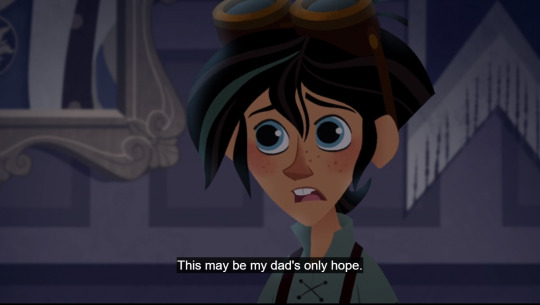
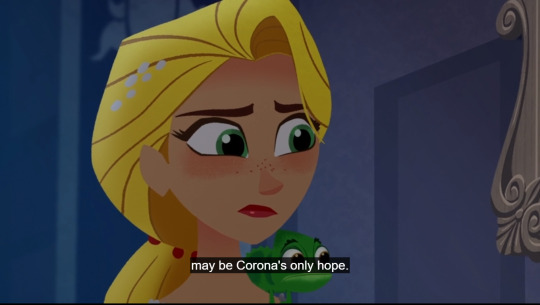

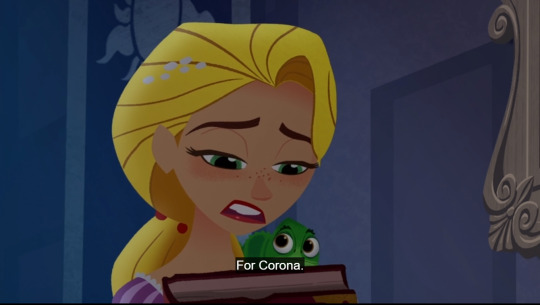
Quirin and Corona are both facing the same problem. Solving one will inevitably mean solving the other. Any distinction between the two is solely created within Rapunzel’s own mind.
She does this to to hide her true motivations and conflict from herself. The show does this to try and villainize Varian over Frederic.
There’s a clear bias in who the series wants you to root for and so it skews the perception of what’s actually at stake by creating a non-existent competition between Quirin’s life and the country’s safety. Even though Quirin, Varian, and Old Corona are all apart of the kingdom. They’re all Rapunzel’s and Federic’s responsibly too. Saving Quirin’s life should be more than reason enough to steal the flower on it’s own.
But this is ‘Rapunzel’s show’ and according to the creators, that means that her personal feelings are more important than actual human lives. Not really, but that’s their mindset and approach to conflicts in the show.
Rapunzel’s True Motivation is Revealed

So we’ve followed the hints, but here it is stated outright. This was never about Corona, the rocks,Varian’s safety, nor Quirin’s life. This is about her need for autonomy. Her own personal quest for assertiveness. She’s been bullied and abused by two steprate parental figures now and she’s growing tired of it. Which is understandable and valid, but it shouldn’t be made more important than everyone else’s problems. Everytime Rapunzel says ‘for Corona’, she really means ‘for herself.’
Rapunzel Shouldn’t be the Only Person Solving the Obstacles Here

Varian is just as smart as Rapunzel, if not smarter. This has been established throughout the show both before and after this episode. Meanwhile, Rapunzel is more physically adept than Varian. This whole sequence in the tunnels should have been both Rapunzel and Varian teaming up and complementing the other’s skill sets. They need to be on equal footing in order to sell their conflict later on. But the show deliberately down plays Varian’s competence in this episode in an effort to make Rapunzel look good.
‘Girl power’ shouldn’t mean making the character perfect. It especially shouldn’t mean making other characters weaker in comparison. Women want equality. That means we want to see female characters treated as people. That means we want female characters to be flawed while still contributing to the plot same as the male characters. That doesn’t mean we want to be paraded around as the only competent person in the room. We want to be on the same level as the boys not above them.
Over idealization and glorification of ‘strong’ female characters is just as problematic as damsels in distresses.
Writers like Chris Sonnenburg grew up during the heyday of Third-wave Feminism. Right on the cusp between second-wave and third-wave points of view as women really started to challenge Hollywood’s portrayal of themselves as homemakers and love interests. They wanted to be the heroes for once. Starting in the 60s and reaching pick popularity in the 70s and early 80s, film makers responded by making female characters who could physically fight but either failed to give them any sort of depth and/or made them the only archetype available.
Chris, and several other male writers who lived during this era, have internalized this approach by default without actually examining how it came into existence nor why women would no longer be satisfied by this portrayal of them, if they ever were. All we’ve done is trade one stereotype for another, as male creators fetishize what was once meant to be an attempt to empower ourselves.
Had Chis actually brought more female writers onto the show and listened to the criticisms from his female crew, he could have better avoided problems like the one above. But instead he dug in his heels and insisted that he already knew what we wanted. He doesn’t.
Why Would You Assume This Eugene?
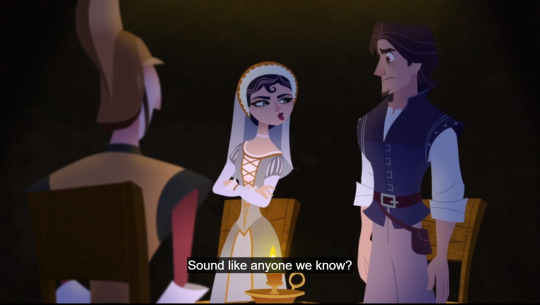


Varian hasn’t actually done anything wrong yet. His worst crimes are drugging people with a magic potion, which is what Xavier did without consequence only two episodes ago, and attempting to steal a magical healing flower that the king has been hoarding from his subjects anyways. A king who has been persecuting Varian unfairly and they know this because of Quest for Varian.
Eugene of all people should be sympathetic towards Varian’s plight. He’s been there himself. He should also know that the rumors about Varian attacking Rapunzel are untrue because Raps told him about the events of Queen for a Day herself.
Meanwhile Cassandra was actually there. She knows Varian’s problems and is supposedly his ‘friend.’ She has even less reason to be hostile towards him.
But once again, the series has the characters respond to things that contradict established events in order to create a bias in the audience. “See, Eugene and Cass doesn’t trust Varian and neither should Rapunzel. See, how evil he really is?” It tries to tell us. In order to convince us to excuse Frederic’s behavior so that when the series does just that through Rapunzel choosing his side we’ll be on board with it. You know, unless you have been paying attention, already have a developed moral code, and the reasoning facilities of an adult.
Rapunzel Lacks Empathy
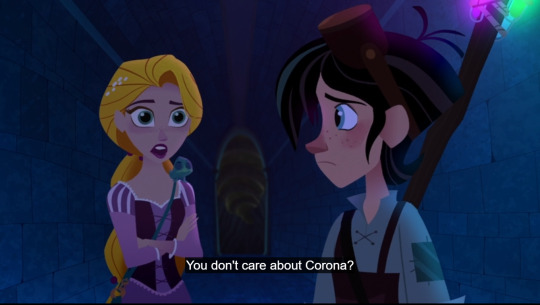
Keep in mind, ‘for Corona’ really means ‘for herself’. The only competition between Quirin and the kingdom is one that she’s fabricated in her own mind. Varian not caring about the island punctures holes into her excuses. Even though Varian is a fourteen/fifteen year old who holds no responsibility for the safety of a whole country. Especially one that’s mistreated him. Of course his father’s life is going to be more important to him.
What Rapunzel is really asking here is, “Why don't you care about what I care about?” “Why aren’t you concerned about my feelings over your own?”
Which makes sense for her character. She’s a woman who has been trapped in a tower her whole life. She lacks the experience needed to be an empathetic person. She’s never had to grieve before. The only permanent death she’s known is that of her abuser. Her trauma over nearly losing Eugene and Pascal was the fear of loss, not the actual process of living without someone. Rapunzel has no framework of reference in order to truly understand what Varian is going through.
Sympathy is feeling sorry for someone. Empathy is understanding how a person feels. Rapunzel may be a sympathetic person but she’s not an empathetic one and there’s a difference between being ‘nice’ and being kind. The show presents to us a woman who needs to learn that difference. The problem is that she never does.
This is actually a brilliant conflict and point of characterization. It’s taking what we already know about a character and expanding upon it to give us believable flaws that impact the story. I actually like this conflict. I like this portrayal. I initially preferred the series over the movie because of this.
I want Rapunzel to be flawed. I want her flaws to to inform the plot. I want to like her as a character. But I can’t. Because the show never acknowledges these flaws, never has her grow as a person. She remains unempathetic and selfish till the end even as she gains more experience, and the show acts like she is justified in hurting others.
This exchange is the quillivant of a rich person who donates money to environmentalist causes trying to shame a poor child for daring to ‘waste water’ in order to take a bath, even while ignoring their own factories spewing pollutants into the local river. The show tries to claim that classism is okay so long as it’s perpetuated by the creator’s favs.
Varian is in the Right
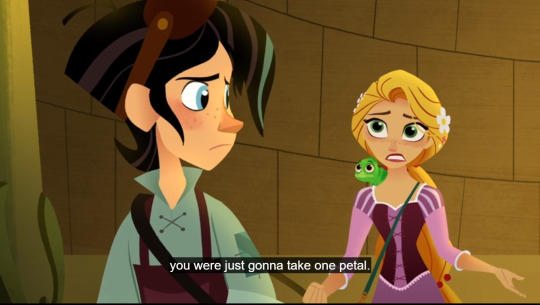
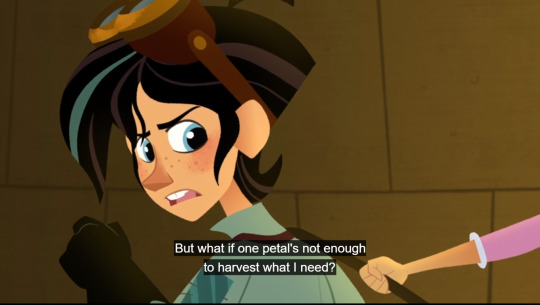
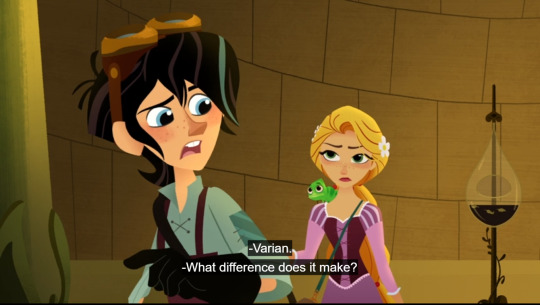

First off he never claimed that he was only going to take one petal. Rapunzel just assumed that. Also, he’s right there is no difference. Once again Rapunzel has fabricated a distinction in her mind in order to have an excuse to sell her dad. She only hesitates now because taking the whole thing means there’s more risk of getting caught and less possibility of weaseling out of punishment through deniability.
Never mind that Frederic doesn’t own the flower anyways. He stole it from Gothel first, outside of his land’s borders. Never mind that him taking the flower actually causes harm to others while stealing it back does not. Never mind that breaking a law to save a human life is not only justifiable but preferable. Never mind that the king is essentially hoarding medicine from the populace, thereby breaking the social contract of a leader towards his people and becoming a despot instead.
No, Varian hurt Rapunzel’s feelings so he’s evil don’t you see? He placed his needs above the main character’s wants and desires, ergo the series treats him as a villain.
Look, I’m not saying that Varian is without fault nor that everything he does is justifiable. But the show (and certain fans) goes out of its way to demonize the character even when he’s doing what’s actually morally right. This isn’t the point when Varian falls to the darkside, that’s yet to come, but it is the point where the series starts to play favorites with its characters at the expense of teaching coherent lessons.
Inconsistent Messages


Yes, how dare he do the exact same thing as Pascal and Max did two episodes later. Don’t you know, he’s the villain; even though he actually has more reason to use the truth serum than they did the mood potion.
The problem of centering so much of the conflict on Rapunzel’s personal feelings means that Rapunzel and the show has double standards for how characters are treated. Friends of Rapunzel gets free passes. Lack of friendship means you’re now the enemy and can’t be excused. Even though in real life that is what we call nepotism and an abuse of power.
Authoritarianism Vs Consequentialism

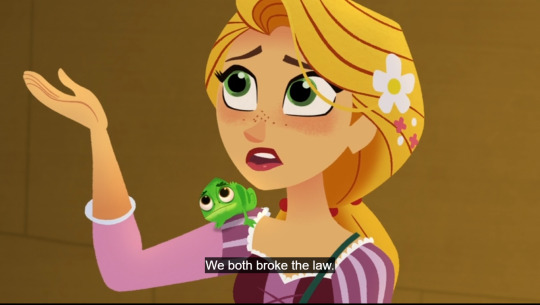
When you mention the word authoritarianism to someone they automatically picture in their head armed men in uniforms marching in the streets attacking innocent people on behalf of a dictator’s orders. Yet, that’s not what authoritarianism is. That’s fascism, which can spring forth from authoritarians gaining political power but it’s not the only manifestation of this philosophy.
Authoritarianism is the belief system that the ‘authority’ is always right, even when wrong. An authoritarian will find any excuse to follow and believe in their chosen authority even when that authority has failed them or others.
The opposing philosophy here is consequentialism. That’s the belief that right and wrong are directly linked to consequence. To their minds something is morally wrong if the action has a bad outcome for others.
To illustrate the difference let's look at a near universal rule.
“Murder is wrong.”
Now both the authoritarian and the consequentialist will normally agree with this. But the ‘why’ to them couldn’t be any more different.
To an authoritarian ‘murder is wrong’ because the authority has deemed it so. That authority can be anything that the anthoritian has personally chosen; God, the government, their parents ect. It’s completely arbitrary and subject to change on a whim. The authoritarian lacks consistency and conviction and will often have multiple chosen authorities that will contradict one another. If one of those authorities came out in favor of murder then there’s a strong chance that the authoritarian will change their position or belief as oppose to denouncing their chosen leader.
Meanwhile, ‘murder is wrong’ to the consequentialist because there are clear irreversibly bad consequences for doing it. It removes a life from the world. All possibilities for that person are now forever snuffed out. It hurts those left behind. ect. The consequentialist is consistent in their beliefs so long as the consequence remains the same. They can’t be swayed by mere orders. That’s not to say that consequentialism is incorruptible. A consequentialist can easily become a knight templar if they are forced to weigh consequences against each other. Then it becomes ‘murder is still wrong unless it achieves this arbitrary goal’.
In truth, morality is a sliding scale for most people and you normally hold more than one ethical belief system. However history has proven that authoritarianism is the more often dangerous and corruptible philosophy as it relies heavily on peer pressure, groupthink, and yes, abuse. Most authortians don't come from healthy loving homes. Either they were abused or are abusers themselves. When conducting studies on authoritarianism psychologists and sociologists use questions about parenting in order to pinpoint who is and isn’t an authoritarian as most people aren’t going to just come right out and claim we should go back to feudalism and the divine right of kings.
An out of control authoritarian is a bully with power. An out of control consequentialist is just a vigilante.
Frederic and Varian are the representatives of the two sides of these opposing belief systems and the representatives of what happens when people with those belief systems become corrupt. By having the main character choose between the two of them and siding with the her father, the authoritarian, the show is now validating this philosophy.
Breaking an unjust law shouldn’t be presented as a bad thing here. Blindly accepting Frederic’s rule shouldn’t be the end result of all this. Excusing his abusive behavior shouldn’t be the finale outcome of the story. There’s not a single thing that Frederic, and by extension Rapunzel, does that hasn’t been done by corrupt governments in the real world. Their reasons for doing so be damned.
Given the current political landscape and the increasing push to give real life anthortirans more power, this was absolutely the wrong message to put into a children’s show. It’s not that children will grow up to become authoritarians themselves by just watching the show, but it can condition them to go along with authoritarian abuse if they are now familiar the excuses abusers use to validate their actions. Especially, if they are already trapped in an abusive environment and are being fed these excuses by their current abusers.
I've already seen this toxic thought process played out by younger members of the fandom who are only just now forming their moral codes. “Accept what’ve you’ve been given.” “It’s okay, your parent (the authority) loves you and knows what’s best” “Hurting people is alright because they’ve been hurt you need to ofter up understanding”
NO!
Theses aren’t good lessons. These are the lies fed to you by abusive people. And the show repeatedly validates, justifies, and excuses both abuse and political corruption. Whether the creators believe this philosophy or not, they just approved of it anyways through their own incompetence.
Varian has Every Reason to Not Trust Rapunzel


This the third time in three months that Rapunzel has backed out of helping him. All for increasingly flimsy reasons. She’s making a lot of promises here but not offering up any concrete solutions. Remember she’s not ready to confront her father yet, and neither of them know that she’s the sundrop herself. So what is her plan here? How is she suppose to recuse Quirin and prevent Varian from being unjustly punished if she can’t stand up to the one person who is responsible for causing these problems in the first place.
Can you really blame Varian for going through with what he does here given how she has treated him thus far and would most likely continue to treat him? Yet that’s precisely what the show wants you to do because ‘stealing is wrong’ even though in this case it actually isn’t.
This is Out of Character

Once again, both Cass and Eugene have no reason within the current narrative to be so hostile towards Varian, yet. They’re only doing so now to create bias in the viewer. For Eugene this is especially out of character. I mean we’ve already seen Cass place her ambitions of above others people’s needs both before and after this, but Eugene is constantly written as the heart of the show. He’s suppose to be the most empathetic and caring person in the group, and yet here he is trying to arrest an orphan who’s only stealing to survive. Sound familiar? He of all people should be the first to defend Varian not attack him.
Excuse You, Raps!
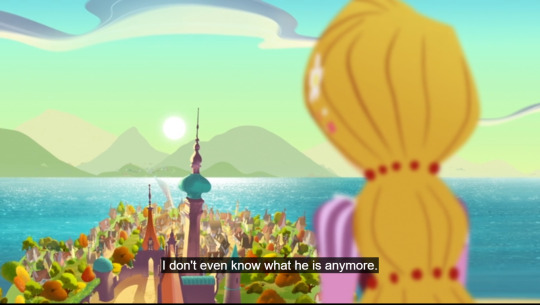
You know very well what he is. He’s a child. A lost, lonely, grieving, and desperate child who’s been let down by everyone who is responsible for him including yourself. But far be it for the show to actually point this out by stating it plainly and show you for the self centered ass you really are.
Scenes Like This are Why Varian Should Have Been the Deuteragonist
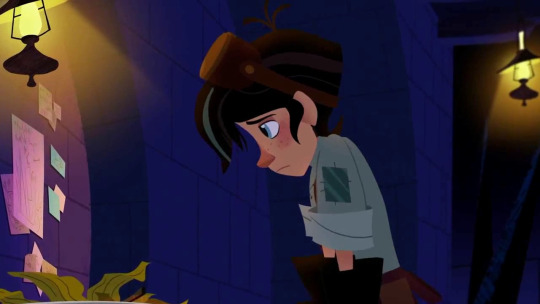
His story maybe connected to Rapunzel’s but it doesn’t revolve around her. He has his own stakes and conflicts that happen to intersect or oppose with Raps given whatever point in the narrative we’re at. As such we gets scenes like this one in his lab where he is the sole focus and is pushing the story forward. No other character actually gets this.
Eugene’s arc has little to no bearing on the overall plot and Cassandra’s solo scenes in season three do nothing to further push the story nor give new insights into her character, as her given goal and motivation is too dependent upon Rapunzel herself to be shown separately.
Out of all the main characters, Varian’s conflict is the only one that holds enough tension to maintain a separate story line. He needs this focus in order to make sense of what's going on with the larger picture and to resolve his conflict in a satisfying manner. Had the the creators been smart enough to follow through with Varian’s story till the end instead of dumping it at the last minute in season two and hastily rewriting a half-arsed resolution it in season three, then we’ve could have gotten the Disney equivalent of a Zuko vs. Aang, Loki vs Thor, or even Duck vs Rue/Fakir arc. As is, we’re only left with the table scraps of several loosely connected stories none of which are very satisfying to watch.
Conclusion
I still like this episode and Varian’s arc overall but I can't in good conscience call it well written knowing now where it all leads to. Nor can I in could good conscience recommend the show knowing the awful morals it touts. And that makes me angry. Angry that I was fooled into thinking that this show had depth and maturity. Angry that I ever once held this show up as being good. Angry that I invested myself into believing that this show would finally give me a decent Disney anti-villain that I could like. Angry that trusted the creators not to be raging arseholes who made poor creative decisions based off of ego and questionable ethics...
I started this marathon so that I could vent my feelings and gain some closure, while also opening up a frank discussion about how bad creative decisions can lead to bad lessons in children's media. This show has many of the same problems as a lot of current tv series do but all condensed down into one place and there are things to be learn from that.However after this series of reviews are over I doubt I’ll ever watch the show again. It’s honestly not worth the time.
#varian#rapunzel#anti-tangled#anti-rapunzel#tangled#tangled the series#rapunzel's tangled adventure#review#character analysis
208 notes
·
View notes
Note
And Theon bc I love him
WHAT A COINCIDENCE I LOVE HIM TOO (this answer is gonna be a combination of books and show)
Send me a character and I’ll tell you the following:
• Did they live up to their potential? / In what ways was their potential unachieved?
-I would say yes. The only negative I have about his general arc is his death (which, see below). But Theon from the very beginning was, though not a particularly nice person, still relatable. Feeling othered, wanting to be accepted by an immediate environment that doesn’t accept you, isolated from and ostracized by your family, and the tension that comes between serving the different types of familial relationships in your life. Theon has no idea who he is, tossed aside by his blood family for not growing up with them and being “soft,” aka sort-of moral and having emotions that aren’t selfish rage or smugness (which, yep, that second part is a mood, see: my entire childhood and how no one wanted to be around an “emotional” “soft” child). And from there, he spirals out of control in a way that, while certainly not admirable by any stretch of the imagination, is still understandable in the context of the narrative and his characterization. And from there, after going through hell and quite literally losing himself (even to the point of straight-up denying rescue), he builds himself back up gradually, to the point where he expressed extreme regret for what he’s done, helps an innocent woman escape a truly horrifying situation, acknowledges that his family is generally garbage, and (in-show b/c again books aren’t finished), helping to restore his sister to power, rescuing her after his PTSD relapses while confronting Euron, and ultimately opting to protect the Starks come hell or high water in order to genuinely atone for what he’s done. He is no longer conflicted because he wants to do the right thing, and that right thing is defending the kingdom from the White Walkers and making sure Sansa and Bran are safe. And it’s no longer about fulfilling a duty or finding a family to fill the void. Because now he has found himself. I will contend that Theon has one of the best, most nuanced, most organic redemption arcs of all time. I will forever be grateful that I got to see that piece of storytelling unfold.
Although, I would love to know what he thought of Dany. A missed opportunity, that.
• How they negatively and positively affected the story.
-Positive: His arc of identity and finding where your loyalties lie ties into the overall theme of “How do you find yourself in a world where goodness, authenticity, and honesty are often punished and increasingly rare?” And it proves that governmental politics aren’t the only defining factors in decisions: familial politics can be just as difficult and dangerous, which adds yet another rich, complicated layer to the overall story. He has a genuine, honest-to-Drowned-God redemption arc, which is...not really present anywhere else in the story (no, Jaime is not on a Redemption Quest, I will die on this hill). But I think the biggest draw of Theon’s presence is that it deconstructs the whole “Character Revenge Fantasy” idea. He does bad things. We want him to be punished. But not like that. No one deserves that. How far is too far? What does retribution really look like? Given how easily that idea can be abused and go off the rails, is retribution even something to strive for? What is the point of using extreme violence/torture/mutilation/breaking someone’s psyche when it doesn’t really accomplish anything? Isn’t atonement and genuine justice a better option? It certainly was for Theon. He could only piece himself back together and do anything meaningful once he was out of his abusive environment. All of these are imporant questions that are posed by his existence in the narrative.
-Negative: Idk if I have much to say here. My biggest problem is his death (see below), but that’s not really a negative story effect so much as...being disappointing and narratively irrelevant. I gotta say, his introduction via his sister was...really weird. I genuinely have no idea why GRRM wrote that. It never came up again or had any kind of narrative ramifications and kind of cast a strange, uncomfortable light on his relationship with Asha/Yara for the remainder of the story. I can ignore and enjoy their later relationship it if I don’t think about it too hard, though, so I guess I’ll chalk it up to GRRM having a Bad Idea.
• What my favorite arc for them is.
-All of it?? Theon’s journey is kind of...one big arc, which is why I think it works so well. He has this overarching redemption plot which spans the entire series and informs every decision he makes (for good or for bad, depending on where in the aforementioned journey he is). The redemption arc isn’t bogged down with side plots or other pieces of narrative clutter, meaning it has time to grow and, thus, be gradual and realistic. If I had to choose a specific point, it’s probably when he tries to reintegrate back into society via supporting Yara. Gaining the Iron Islands’ support for her ruling, spiriting away with Euron’s fleet, and ultimately rescuing his sister after her capture. He can’t just go back into society. He’s scared. He has really bad PTSD. But he recognizes that putting his home in good hands is something bigger than just him because it’s Yara’s home, too. I just...I really love family relationships, y’all.
• What I think of their ending.
-I’m not really sure how I feel about this one. I get that the series is GrimDark™ and that people who make the right choice and fight for good die all the time, but Theon dying just felt...wrong. To me.
And, like...I get it. It makes sense to parallel his original descent into villainy (cemented by executing those two boys and pretending they were Bran and Rickon) with him dying to protect Bran himself. It ties into the whole very common trope of completing a full redemption arc by committing a completely selfless act at great personal cost. It’s kind of like the whole Missy thing in Doctor Who (which...hoo boy, that post is coming, make no mistake), where selfishness is directly opposed by making the ultimate sacrifice with no motivation for personal gain. And the fact that the last words he ever heard were “You’re a good man?” I cannot even begin to describe how much that makes me sob. But...honestly, I’m really tired of this idea that redemption has to end in death in order to be achieved or “complete.” I think it’s much more poignant to have a redeemed character live to help build a better world. Because what’s the point of telling people to be better if the “reward” is death? No one’s going to want to reform themselves if they think that’ll be the result.
I think the thing that Bugs Me™ the most is that Theon never really got to have a moment of peace when he was alive. Sansa gained the North’s love and at least had a secure childhood. Ned and Cat were happily married for years. Arya had parents who loved her and a good relationship with Jon. Jon fell in love with Ygritte and found his Night Watch Bros, and Robb (in show verse) had some very happy moments with Talisa. Davos put great stock in what he considered fulfilling friendships with Stannis and Shireen; Brienne was treated respectfully by Renly, Catelyn, and Sansa; Missandei and Grey Worm had each other and their friendship with Dany, who herself had many personal successes in her quest for the Iron Throne and saw the death of her abusive brother. Cersei even had moments with Jaime (who himself had several notable military victories and at least some time with Myrcella, as well as being gladly and deeply in love, however dysfunctional that love was), times when she successfully fought off enemies (including her dad), and some sweet moments with Tommen, as well as a huge victory via blown-up sept at the end of season 6. Theon was treated as a second-class family member by the Starks his whole life by being “traded” to them as a condition of war resolution AS A BABY, is immediately disparaged and mistreated by his immediate family when he tries to return to them, makes terrible decisions that almost cost him his conscience completely, is brutally tortured by Ramsay, is on the run with his sister from Euron almost immediately after, and has a PTSD attack that ultimatly results in him having to launch a rescue mission. And then he fights ice zombies. And then he dies. He never really...got to be happy at all? There was never any kind of “win” for him. Not even survival. The narrative couldn’t even give him that.
TLDR: Theon’s death seemed less shock-value-y than others (like, for example, Shireen or Missandei or, heck, Melisandre even), and it isn’t the worst thing I’ve ever seen. It’s narratively-informed and it makes sense as an emotional through-line, but, ultimately, Redemption Cemented By Selfless Death is a tired trope, and I honestly thought this story (which...you know...serves as a deconstruction of common fantasy tropes/book tropes in general) was better than that.
• When I wish they had died. / If I think they should’ve died.
-So here’s where we get personal™ kids.
So, it’s no secret that I am...severely mentally ill. I’ve talked about expression/presentation of mental illness in regard to Cersei a lot on this blog, and how that (as paradoxical as it may seem) helped bring a sense of comfort and emotional resonance to me. Theon, post-Ramsay, has, I think, a very clear case of PTSD. Theon is one of the few characters I’ve seen where his mental illness isn’t the cause of the bad, violent, dangerous choices he makes. It only takes root after he has made the decision and conscious effort to better himself, and it, rather than demonizing him, serve to humanize him. His trauma didn’t define him. And although a PTSD attack led to him unintentionally losing Yara to Euron’s capture, he makes every effort to rescue her, a goal he does end up achieving. It is so rare I get to see a character who goes through these things, successfully fight them and come out with positive qualities at the end. Like...switching topics a bit here, Jaime going back to King’s Landing to (try to) escape and ultimately die with Cersei made sense to me because, as Jaime says, he is a hateful man. He never made much of an honest effort to be anything else. And he never truly wanted to be good; he just wanted to be liked. He wanted to adopt some personality that would make him feel less disconnected from the rest of the world. But Theon...genuinely feels remorse for everything he’s done. He makes a concerted effort to do everything in his power to improve the lives of people he believes are good and deserve to be safe. So, just...killing him off in a Completely Selfless Sacrifice (like...you know how a lot of mentally ill people put themselves through suffering-like OCD rituals, bottling feelings, self-harm, even suicide-in a misplaced attempt to “help” or “protect other people”) seemed antithetical to everything we saw of his arc.
Ultimately, with such a humanizing, empathetic portrayal of trauma and mental health struggles, seeing Theon be killed off just...pissed me off. I am so tired of seeing mentally ill characters die. I really want to believe that I can live through and thrive in spite of the things that afflict me, and I get example after example of characters not being allowed to do that. It feels awful, quite frankly. And it makes hope that much harder.
I also just feel like...there was nothing the story gained from his death? I get the thematic parallels as mentioned earlier, but it didn’t really move the story forward in any significant way. It didn’t motivate other characters to do anything, it had no political ramifications, it didn’t serve to contribute to any kind of happy ending or commentary on society, it just...was sad. Again, I thought this story was better than that.
#theon greyjoy#got#my son#mental illness in media#meta#redemption arcs#tw: self harm mention#tw: suicide mention
11 notes
·
View notes
Note
love what you said about the scripts and I think I may be with you on the not-hating-D&D train. on one hand, I appreciate their unapologetic support of JC and all the content we got out of it. on the other, I do think that they fundamentally misunderstood the characters and the overall story, and that made for some questionable creative choices throughout the years. even on the JC front, I’m conflicted. I love having a version of the story where my OTP doesn’t take the beating that they do in the original, but I also think that that beating is essential to their story. I won’t bore you with the intricacies of my interpretation of asoiaf but, suffice to say, I’m not a big fan of D&D’s interpretation. that said, I used to be much more critical of D&D’s writing until I started thinking about GoT like a big budget, canon divergent, lannicest-centric fanfic. which isn’t ideal, but it’s fine. no adaptation could have pleased every subgroup of a huge fanbase and tbh it’s pretty obvious at this point that most people are just parroting the critical talking points as a way to justify the hissy fit they threw over their ships not being endgame. the average audience member doesn’t actually have an ounce of media literacy and you can tell that simply by asking them WHY the things they didn’t like about season eight* fall under “bad writing” and not under “I personally didn’t enjoy this”.
*it’s also ironic how they only ever talk about the final season, despite the fact that GoT’s storytelling problems started around season 3. it’s almost like they don’t know what “bad writing” means and don’t care to find out.
so, that’s it lol. sorry about that long ass rant it’s just that you’re literally one of the first people I’ve seen being critical of the mindless GoT hate.
much love <3
Hello! Honestly, you make a great point about the 'good writing' and 'bad writing' thing being largely affected by whether people actually liked what was happening on screen. I recognise that my own point of view might be affected by that because, again, a good bit of the show was tailor-written for me in a way that the books, as much as I enjoy them, are not, so it only makes sense that I'd approve, and that goes for the people who were dissatisfied, too. To top liking the content, I enjoy their writing style, too, so that helped.
I'd love to hear your interpretation, to be honest! They definitely have a whole different view of the characters, separate from GRRM's vision, and it does occasionally feel heavy-handed in a way fanfic does - and I say that with a lot of love in my heart, because it's what I do when writing those characters, too, even if it's obviously on a much much smaller scale.
IMO the divide mostly stems from the fact that D&D want to present the Lannisters as fundamentally right in their choices and the rest of the narrative is spun around that*, which doesn't happen in the books because, as you said, their harsh/generally bad decisions have much worse consequences in the books and they get away with essentially everything (until the very very last minute) in the show. Tyrion actively gets away with everything, even, and the twins are remembered well, and the narrative shoves all those things in your face really smugly, which, again, I enjoy and was inordinately gleeful about, but I do realise that it's not for everyone.
*One thing that immediately comes to mind is how they said that Dany killing Viserys - who, while terrible, was her caretaker as a child - was one of the earlier signs of something being wrong while also explicitly showing Cersei - who has actively been antagonistic towards her brother for the majority of their lives - sparing Tyrion's life with no real gain from it twice because none of the three of them actually want each other dead. I think one of the Ds specifically said it in the commentary for 8x04, where the above happens, and the parallel shoved my third eye open with a crowbar. I don't even know if it was a conscious decision they made, but it was... telling about why the show's narrative is what it is.
'I used to be much more critical of D&D’s writing until I started thinking about GoT like a big budget, canon divergent, lannicest-centric fanfic' I love that, haha. With a generous sprinkling of Starks! Honestly, at their core, all adaptations are just that, and you really can't win 'em all. I do think that they could have probably been at least a bit more neutral about it, but then I bounce back once I look at even a fraction of the bitter, thinly-veiled misogynistic venom fans a-la r/freefolk spill to this day, and think that this is exactly what they deserve.
That being said, I agree that the characters are fundamentally different in the show from what they are in the books and, as you said, they diverge very early on - earlier than most people would admit, so what happens in the books would have never worked once the show went on its merry way and shaped its own canon, and while the bare skeleton of the ending is very likely the same, I'm sure a lot was lost in the process and was padded with their own bias and 'lessons' for the audience, which are definitely a whole other thing from what he clearly has in mind.
I don't know if that makes much sense, but the thing that D&D had that GRRM didn't when he was in the process of writing was all the material that he has, all at once, so they sidestepped several corners that he's definitely written himself into by just doing something completely different so that they'll have a finished product even if they're done before him - which they, in the end, were. And again, I love that product, but there's no way the rest of the books will follow even remotely the same storyline, other than a few bigger points, and that's fine, too. It's a rather unique situation to be done with the adaptation before the source material and, whatever the latter ends up being, I'm sure I'll enjoy it, even if the show will now always be the true canon in my heart - for no other reason than because I love what it did with the characters, which takes us back to your point about how for most people 'good' or 'bad' is less about the actual quality and more about their tastes.
You don't need to apologise! Especially not since I ranted in response. ;D Much love right back! ;3
2 notes
·
View notes
Text
Fragments
Everything below is just my opinion; I am in no way trying to say that how I feel about this is the one correct take or whatever.
I know a lot of people like this episode and what happens in it, but I don’t. I totally understand that some people just don’t want to see any negativity, period, but negativity is not inherently bad or wrong.
Negative opinions, even about something you enjoy, can be valid too - regardless of whether you happen to agree with them or not.
Also I get very salty near the end of this, and that might be entertaining to people who stan this episode?
I am aware that a lot of people – the majority, I’m pretty sure – think that the episode is a masterpiece. And on some level, I see where they’re coming from with that assessment.
The episode is boarded beautifully, the backgrounds – especially during the training montage – are stunning as always. The music is fantastic, and the performances are great too. In these respects, Fragments is a stand-out episode; I agree.

(Like look at this. Gorgeous.)
However, something that’s bothered me since I saw the episode is the writers’ decision to write it into the story that Steven shatters Jasper.
Now, I know what you’re thinking: I just don’t get it. I’m purposefully misinterpreting the story to say it’s bad. Steven brings her back to life; and it’s not like he meant to do it in the first place. I just don’t have the capacity to understand the sublime nature of the show’s storytelling. I’m an SU crit and all I want to do is make the real fans feel about themselves for liking it.
Uhhhh... no. Nah. That ain’t it chief.
It’s true; I am not a writer. I’m just a passive consumer of media. However, I do not agree with the viewpoint that in order to properly understand or critique a thing you need to have the expertise and/or experience in order to make something similar.
For example, if I were to put something I drew when I was 10 years old next to something I drew yesterday, it shouldn’t take a person who has had an education in fine art to tell you that the latter drawing is better-looking than the former.
That’s how I approach media consumption and criticism; when I criticise a writing decision, I am doing so as a consumer. I’m not saying I could write it better, or even that my opinion is objectively correct and the writer is wrong or bad. I’m just saying that I didn’t like a thing. Which, I would hope, is allowed?
Okay, defensive hedging over, back to the point; I don’t like that they had Steven shatter Jasper.
[I get markedly saltier from this point on, fyi]

Full admission of bias here: one of the things I really cherish about the original show is how they wrote Steven’s character; he’s a boy with interests that don’t rigidly conform to gender stereotypes. He likes ‘boyish’ things and ‘girly’ things, and that’s okay; thats just him. In cartoons when I was growing up, characters like Steven would be the butt of jokes about being ‘girly’ or thinly-veiled homophobia. I find him very relatable, and I want to acknowledge that yes, that is probably a significant part of why I have such an issue with this episode’s twist.
I am not trying to say that he’s a perfect baby angel or whatever; Steven regularly gets frustrated and angry. He does some pretty manipulative and dickish things to people around him (stop trying to make Larsadie happen, Steven. It’s not going to happen). He is a flawed character who fucks up sometimes. And he’s not 100% peaceful either; he acts violently when he defends himself against corrupted Gems and Homeworld Gems (and Crystal Gems on occasion *cough*Bismuth*cough*).
However, he has a pacifistic temperament; whenever it’s possible, he prefers that problems be solved without needless violence or hurt. And I like that; in most media, it’s rare to have a male protagonist who wants to solve their problems without jumping straight to punching things.
When he accidentally frees Centipeedle, he convinces the Gems to step off and allow him to try and rehabilitate her peacefully; he even notices that the Gems’ weapons are a trigger for her, and make them put them away. He frees Lapis against the Gems’ wishes because he recognizes that keeping her prisoner is wrong, and when she steals the ocean, he talks it out and heals her so she can leave Earth peacefully.
He tries to aid Jasper when she starts corrupting, fixes Eyeball’s gemstone when she’s cracked and tries talking Bismuth down when she attacks him with the breaking point. In all of these situations, his words and help are ignored or rejected; he’s forced to resort to violence. And it traumatises him.
We get an entire episode dedicated to the fact that he’s been struggling with processing these awful things that happened.
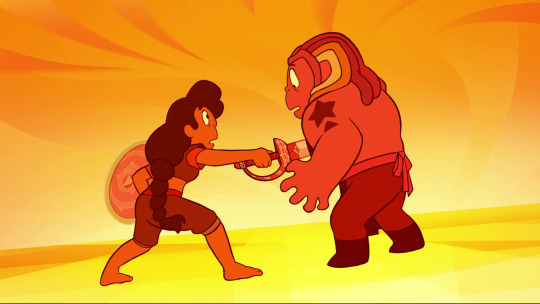
Even in Future, Steven shows hesitation about engaging in unncecessary violence; he gives into Jasper’s goading for a fight after what’s implied to be dozens of failed tries at making her come to Little Homeschool, and he spends an entire episode trying to keep Lapis from squashing the two rogue Lapis Lazulis.
The only time he hops into a fight willingly is after Eyeball and Aquamarine hold Greg hostage, and even then they pose a clear threat to his and Greg’s safety and have made it clear that they want to hurt him emotionally and physically. Even at that, he stops and switches tactics to talking them down as soon as they lose their focus and start bickering with each other.
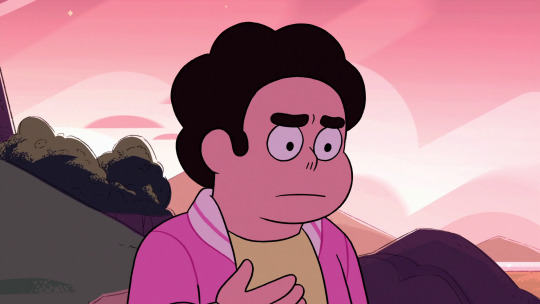
(I mean, he fails. But it’s the thought that counts.)
I personally find it really jarring that the writers found it appropriate to write it into the series that this same character – over the course of three (3) days – goes from disliking mindless violence for mindless violence’s sake to happily engaging in the destruction of plants and animals* and has done a total 180 on his willingness to spar with Jasper, to the point that he instigates their rematch.
*(You best believe plenty of small mammals and birds – y’know, like the nest Steven saved in the first episode – died as he and Jasper felled tree after tree, not to mention all of those displaced by the destruction of their habitats, and the potential loss of food sources from some of those trees.)
You’re telling me that it’s a reasonable character beat for this boy to gleefully laugh like an anime supervillain at his sudden new-found joy in fighting, then pin Jasper in place, taunt her for helping him get so strong, and hit her so hard that she breaks into pieces and dies?

You’re telling me that that’s an in-character thing for Steven Quartz Diamond Cutie-Pie DeMayo Universe do to another character?
(And yes I am purposefully dancing around talking about the mental health stuff because if I did that I’d have to go on a whole other tangent about Growing Pains and fuck I just don’t feel like it right now lmao)
Going back to Mindful Education, another big thing we see Steven struggle with is the idea that his mother shattered Pink Diamond. This knowledge sits heavily with him; it makes him sympathetic to the Diamonds, even under the circumstances in which he sees them (escaping from the Human Zoo, and being on trial for said murder).
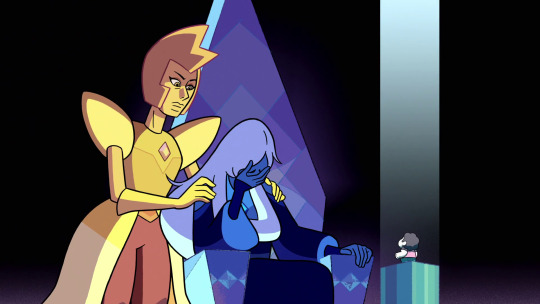
He sees their grief, and he feels awful. He questions who Rose Quartz even was. He knows, based on what Garnet said, that Rose had to do it; there was no other way to free Earth. But he still feels awful seeing the pain that Pink’s loss has caused Blue and Yellow Diamond.
In Steven Universe, shattering is clearly equated with execution/death multiple times. When Pearl and Garnet fret over the crack in Amethyst’s gemstone worsening. When Blue Diamond threatens to break Ruby. When Bismuth introduces the breaking point, and Steven recoils at the sight of what it does. If you want to take the fact that Gem shards are sentient and desperate to become whole again into account, you could even argue that it’s a fate worse than death. This particular act of violence is treated very, very seriously.
When we find out that Rose shattered Pink Diamond, there is a season and a half long arc unpacking the implications and consequences of this one action, and how this knowledge forever alters Steven’s mental image of his mother. And she didn’t even kill anyone. It was a lie!

In Steven Universe Future, Steven shatters Jasper 4 episodes before the end of the series. And it’s only brought up twice; once for a big *gasp* moment during his breakdown in Everything’s Fine, and in I Am My Monster by Pearl, when she has to fill-in Bismuth, Lapis and Peridot. Notably, it is never discussed around or by Jasper. Y’know. The person who actually died.
No indication of how (or even if) what Steven did is affecting his own self-image after his initial breakdown, how Jasper feels about what she went through beyond falling back into the Era 1 and 2 mindset. No inkling of how the knowledge that Steven killed somebody has affected how anyone in his life thinks or feels about him; when Pearl brings it up in I Am My Monster, she seems to not even really believe it’s true.
If there are any consequences or talks about this incident, they’re skipped over between I Am My Monster and The Future, and we’re expected to assume that Steven and his therapist are dealing with it, I guess?
And yes. It was an accident. He did bring her back to life. But it still happened. If you hit someone over the head and they stop breathing, just because the paramedics are able to resusitate and stabilize them afterwards doesn’t mean you never hit them.
But here, it’s shoved aside because dwelling on it would take far too much time, and risks framing Steven in an unsympathetic way when he’s meant to be on the cusp of a breakdown.
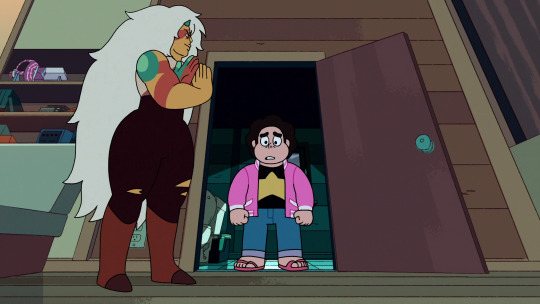
It just feels like careless writing to me. They really, really wanted their big action scene with Steven and Jasper, but didn’t think (or maybe weren’t interested in thinking) about the seriousness or consequences of what Steven shattering someone would entail.
In my opinion, Steven shattering Jasper is one of the cheapest, laziest things they could have ever done with his character (and hers, for that matter). To me, the entire thing feels entirely out of character. It’s pure shock value; nothing more.
So yeah. That particular writing decision just does not work for me. And if you disagree... well that’s fine? It’s fine. We can agree to disagree? I’ve read a lot of defense/praise for this episode, and honestly even after processing all of those opinions and all the time my thoughts about this plotline have been stewing in my brain, I still feel the same way.
7 notes
·
View notes
Text
Netflix’s Shadow and Bone: My Fangirling Thought-dump
Fair Warning: I’m a darklina, so leave now if you’re not going to be decent (I don’t bash on Mal, though, so you’re safe there)
So I binged Shadow and Bone without reading the books (judgmental people, leave now), and let me tell you, I love the show. True, there were some things I wish were different based on what I’ve been spoiled on about the books, but as a show in and of itself, it’s strong.
So here’s just a dump of my thoughts and fangirling (I use *chef’s kiss* a lot). And obviously, spoilers ahead.
***SPOILERS AHEAD***
WHAT I LOVED
- The storytelling, both narrative and visual, is exquisite. How the dialogue contributes to the storytelling, answering the audience’s questions and doubts clearly even before they’re brought up; how the visual arrangement contributes to informing the audience of what they need to know and how that timeline of knowing helps the audience in piecing together the story, the characterization, and the timeline; the tying in of characters’ storylines so audiences are not confused as to why we’re spending so much time watching the goings-on with a character. *super chef’s kiss*
The show is so organically unified in terms of characterization, visual media, dialogue contribution, and so much more that I just, uh, I cannot even! I LOVE THE ART OF IT!
- How the show dealt with race, identity, prejudice, politics, social acceptance, individual needs, personal wants, the desire for security and safety that mean differently for each character *raises both hands to the heavens in thanks* The show’s concepts hit close to home for me in terms of race, prejudice, mixed biological identity that informs social perceptions, the desire for belonging and safety and acceptance, and I think this show would hold a special place in my heart for its portrayal of these issues.
- How different sexualities and genders are portrayed so casually, as if it’s an everyday normal thing (as it should be).
- The Crows (of course) and how their story intersected with Alina’s, and how the storytelling (I’ll keep going on about the visual storytelling until I run out of breath) shows the intersections and develops the diverging stories to meld into each other
- How they showed how brilliant Kaz’s mind is. The visual storytelling of showing one scene without explanation, leading the audience to create their own assumptions on what Kaz was seeing, then having the scene turn out different once it has been explained later when things have unfolded *chef’s kiss*: the meeting between the Conductor and the First Army General, the hidden changing room, the lynx flush assignments
- How Inej’s faith is portrayed neither negatively or positively; it’s just a thing that is not contrived but contributes to the plot, not some sort of moral policing inside or outside of the story.
- Mal! I heard he’s a jerk in the books, that’s why I didn’t want to read the books before watching the show. But god, his first scenes with the sparring, and the way Archie moved in that fight. Also how Mal’s overall storyline progressed, how his ties to Alina was shown, how his feelings got revealed to the audience even before it got revealed to Alina so the sincerity is not questioned. That True North thing! *heart eyes*
- How the issue of consent in the sexual sense is highlighted as important. The darkling literally asks “Are you sure?” before he proceeds. (Of course, this is very different from his take on non-sexual consent later in the show - like really, you literally put a control button on your hand to control her powers! Dude...)
- The exploration of Alina’s overall consent and agency. They even literally have her say her lack of it when she was in the final episodes. Even Kaz shoves it in the Darkling’s face that she doesn’t want to be a captive anymore. And throughout the show, the thought processes behind her decisions are clearly communicated, giving her agency a lot more weight as the audience can understand and sympathize with her decisions. And she’s not just a “victim” of the story; she pushes the story along with her actions, from her decision to burn the maps so that she could come with Mal, to her childhood decision to cheat the Grisha test, to something as visually simple (yet strongly narrative-affecting) as choosing the left or right path in Baghra’s escape route.
- The exploration of want. What each character wants, how one want like “security” could mean an entirely different thing for each character (i.e. the Darkling’s want of security for the Grisha, Alina’s want of security for herself, Inej’s want of security in the form of freedom, etc.). The show, being well-written, is a smorgasbord of academic analysis. Again, if I haven’t said it yet, I LOVE THE ART OF IT!
- NINA!!! God, I really like how the actress looks! There’s just something about her face that I really, really like. And then there’s Nina’s lines, the delivery, the attitude *chef’s kiss* One caveat though: I wish she wasn’t made to say “Please” when she was hanging off the ice ledge. Even though she had already warmed up to Matthias (and him to her), I would have wanted the scene to be a clash of his pride and her dignity: just like in the ship earlier, her not submitting even to his kindness (sincere or otherwise), and him having a moral crisis on helping a “witch.”
- Genya’s hand-to-hand fight *absolutely beautiful*
- The overall fight choreographies. It’s not just people punching each other and brawling; the jiu-jitsu locks and judo throws hold a special place in my practitioner’s heart, and the fights look really good, either it be for the women (Hello, Genya and Inej) or the men (Mal and Aleksander’s fight looked so different from usual brawls because of the throws).
- How the different Grishas, even the usually non-combat ones, can weaponize their abilities: Healers can, obviously, break bones; Heartrenders can stop your heart; and even the Sun Summoner can blind you.
- Jesper and Milo the goat. “Grab the goat. Hug the goat. Shut the fuck up.” And how Jesper tearfully parted with Milo LOL
- How Alina just climbed right into the get away carriage’s literal trunk. LOL!
- Kaz and the Darkling meeting. I know it’s not in the books (they’re not even in the same trilogy/duology), so having these two characters with so much gravitas meet and actually verbally spar is *chef’s kiss*
- Inej’s first kill is to save Kaz *heart eyes*
- The Darkling’s humor! “Yes, David?” and “I’ll have to give that speech again” were hilarious!
Of course, there’s many more, generally because of how they contribute to, again, the visual and narrative storytelling and the characterizations and the plot progression and, ugh, I'll stop now or else I'll just keep going on about how much I love how this show was crafted.
NEUTRAL
- I heard that Alina was supposed to be funny in the books, but apart from the “No pressure” and “My tailbone is killing me” lines, there wasn’t really much of that humor in there--most of the humor came from Jesper’s scenes or Mal’s friends. Honestly, I think the show Alina fits the story, so I don’t really care if her humor is not as evident.
WHAT I DIDN’T LIKE
- Gosh, Netflix and the showrunners really know how to market the show. They were right when they said the first step is to cast Ben Barnes. Then the focus on the General/Darkling and Alina’s story and relationship, that sort of dark and brooding archetype getting with the green and pure protagonist, is so delicious. But of course, endgame is not meant to be. The Darkling is a manipulative, controlling, toxic person, and should be nowhere near Alina if not on equal ground. I just wish they didn't put that much focus on it in the marketing (i.e. the extra clips distributed to media sources) to make it seem like darklina could happen, especially with the story changes the show was reportedly doing. Oh well, that’s what fanfiction is for. And I guess there’s a chance for redemption in the following season? *puts on clown nose*
MY QUESTIONS AND...WISHES?
So since the show has changed the story quite a bit from the books, I'm so stoked to see where the characters’ stories lead to. I’m sure there would be similarities to the books (Nikolai and Weylan would show up, for sure), but there would be a lot of changes, I'm sure (Alina’s a Saint now, so how would that affect her life on the run and her relationship with Mal? There’s no great reveal for Aleksander’s name, so perhaps he doesn’t die? At least not that way?).
- I wish we’d see more of that internal/thought connection the Darkling and Alina seemed to have. And I wish they’d highlight further the idea of balancing, of being the only two in the world, and of how each needs/complements the other in terms of power. I just really wish they’d explore more darklina, and perhaps have it open to have a darklina ending (I’m not holding my breath for that one at all, but hey, membership to clownverse is free). At the very least, would there be a change in the Darkling’s ending (does he get stuck in the tree)? Does he get a redemption arc? Would he utter the “I do not repent” line? Would Alina and him have the shared connection, I-can-see-you-even-if-you’re-far-away bond? Would Alina somehow forgive him (hopefully only if he has changed and is not controlling and toxic anymore)? Would Alina and him have a showdown as he tries to expand the fold and she tries to close it? He has command of even the volcra now, so what would that mean for Alina’s side? Does she get an army, too? Maybe there’d be creatures of light, too? Perhaps other animal amplifiers?
- Now that Mal and Alina have more or less confessed to each other and ended up together, what would be the next hurdle in their relationship? They can’t just stay static, after all, otherwise the story of their relationship won’t be a good narrative. Season 1 touched on Mal’s fear of the Grisha (with Alina literally asking him out loud), so perhaps as Alina’s powers grow, Mal’s discomfort with her powers would show more (I hope the show doesn’t make Alina do a Slip-into-the-Darkside trope, or at least not too much to the detriment of her agency and core characterization)? Or perhaps going from that conversation with the Darkling and Mal, when Aleksander seemed to have gotten under Mal’s skin when he pointed out that due to their immortality, Aleks and Alina are endgame: maybe Mal would have that rivalry with the Darkling again and, considering Alina’s kind of psychic bond to Aleks (if they add that in), would feel that Alina might choose the Darkling in the end? I just hope the characters aren’t reduced to stereotypes of 1-girl-2-guys-and-girl-can’t-choose love triangle. Even season 1 explicitly had Alina cut off ties with Mal first (because she mistakenly thought he didn’t want anything to do with her anymore since he’s not replying to her letters) before she went to the Darkling romantically.
- What’s next for the Crows? Would Inej eventually go to Sankta Alina? Perhaps the Ice Court heist is next for the Crows. Nikolai has to show up some time, right? How would that tie in with Alina’s storyline?
I have a lot of other questions on what happens to the characters and the overall story, and I'm really glad that the show has diverged from the books to an extent that a lot of things could be possible. I hope Season 2 does happen, and I hope it’s as good as Season 1, especially since COVID is still happening and filming and filming options are limited. If Season 2 does happen, I hope it gets release soon :P
#meta#kinda#alarkling#sab#sab spoilers#shadow and bone spoilers#netflix shadow and bone#shadow and bone netflix#shadow and bone
4 notes
·
View notes
Text
An essay abt Fabian Aramais Seacaster
This is the essay that i wrote for my greek myth class. The assignment was to find a contemporary example of Hubris and Nemesis.Understand that some story elements are simplified and glossed over bc this was only supposed to be three pages and i wrote five. Idk like one person on tumblr wanted to see it and a few ppl on twitter as well. So enjoy??
In recent years there has been a rise in popularity in TableTop Role Playing Games (RPG), this is due to shows like Critical Role, The Adventure Zone, Not Another DnD Podcast and Dimension 20. These shows have amassed large followings and have even gone and performed live around the world. Viewed as a collaborative storytelling medium, using dice to define the success of one's actions, it is only reasonable to wonder if the traditional storytelling devices seen in classic mythology translates into this medium. Examining the plot to Dimension 20 Fantasy High a clear example of hubris comes to mind. This hubris is shown by a Player Character (PC) named Fabian Aramais Seacaster in the second season of Fantasy High. To understand the significance of the hubris and Nemesis, one must understand Fabian’s personality in the context of this show and how that relates to the situation he was placed in. Understanding Fabian as a character will also allow the viewer to understand how cruel Nemesis was to him. Nemesis’ cruelty can also be examined as a part of games mechanics and reflected in the relations between Dungeon Master and Player.
For ease of understanding, I will first explain the context in which Fantasy High takes place. In the introduction to the show, the Dungeon Master (DM) Brennan Lee Mulligan explains that: “Now we can answer the age-old question of; What if John Hughes ran a tabletop RPG game?” The show follows a group of heroes who call themselves the Bad Kids as they attend the Aguefort Adventuring Academy: the world’s premier training ground for would-be Heroes. It is the first episode of the show that Fabian is introduced. He is a half-elven fighter raised by infamous pirate Bill Seacaster and Hallariel Seacaster. Played by Lou Wilson, Fabian is: “Everything [Lou Wilson] wanted to be in high school; rich and hot.” as he stated in an episode of Fantasy High: Extra Credit. It is here in Fabian’s very first scene that the viewer is given a key insight into Fabian’s hubris. While talking to his father before the first day of school, Bill Seacaster says to Fabian; “You’re my son, you’re a direct reflection of me! You and your glory is the same as mine and my glory! That’s how we relate to each other!” (Mulligan, S1 E1). This statement is important because it will directly play into many of the choices Fabian makes in the following episodes. In the very same interaction, Fabian is gifted by his father an Auguefort Owlbears letterman jacket, as Fabian hopes to make it onto the team with the tryouts happening later that day. The jacket becomes a great symbol for both Fabian’s hubris and identity as he does not initially make the team but still decides to wear the jacket to school nearly every day. As hubris is defined as someone viewing themselves as either above or below their true social rank. hubris is also seen as acting out of an overblown sense of importance. In a society where a social ladder is clear, Jocks and cheerleaders ‘rule the school’ and the nerds find themselves at the bottom, wearing a letterman jacket for a team that you are not a part of is very much believing yourself above your true position on the social ladder.
While the jacket is a minor display of hubris in the first season as Fabian does eventually find his way onto the Owlbears, it is not until Fantasy High: Sophomore Year that Fabian’s hubris is met with Nemesis. In sophomore year, the Bad Kids find themselves on a quest to retrieve the crown of the Nightmare King. Their journey leads them to the pirate city of Leviathan. Here the city is made up of ships roped and assembled together, it floats in the Celestine Sea. On their first night in Leviathan, Fabian separates himself from the party and heads off, now pensive as this city reminds him of Bill Seacaster. On his own, he meets members of his father’s cult. Warlocks who have given patronage to Bill Seacaster as he is now causing chaos as a devil in the nine hells after dying at the end of freshman year. Initially, these pirates praise and celebrate Fabian as he is their patron’s son. They believe Fabian their saviour. Their reaction changes, however, when they ask Fabian to describe how he defeated Bill Seacaster in combat. These warlocks believe Fabian to have killed his father in a grand and epic battle. Although, in actuality, Fabian killed his father in an act of mercy after their home was attacked by mercenaries. Fabian tries to explain this to these pirates and they immediately become frantic and fearful of the lack of potency and power of their patron. They believed Fabian a powerful enough swordsman to defeat Bill Seacaster, thus powerful enough to defeat one of Bill’s long standing rivals, a man named James Wicklaw (Mulligan, S2 E5). With a hurt pride and desperate to prove himself, Fabian declares: “I am perfectly capable of leading an army, Alright? I am my father’s son through and through. And I am as good as he is...” (Mulligan, S2 E5). It is here with wounded pride that Fabian sets out to prove himself in the eyes of his father’s cult. He leads them in an attack against James Wicklaw. Fabian’s hubris here comes from overcompensating for his hurt pride. He goes above his social standing, believing himself powerful enough to defeat Wicklaw on his own. This is however not true, as Dungeons & Dragons is a game where antagonists have challenge ratings and players gain levels in certain abilities. It is up to the Dungeon Master to balance encounters and choose antagonists appropriately. James Wicklaw was a Mind Flayer, listed in the Monster Manual as a level 7 challenge rating. Fabian at the time was a level 8 Fighter (Perkins, p.222). While this seems balanced, Fabian was immediately grappled and stunned, leaving him unable to do anything but watch, while Wicklaw and his crew slaughtered the 20 followers he had brought into battle. Nemesis comes to Fabian by removing his sense of identity. As Chungledown Bim, one of the warlocks says to Fabian before dying; “Ye ain’t no pirate and Bill would spit in your eye…I’m gonna shit in your mouth” (Mulligan, S2 E5). Ultimately these words would affect Fabian so much that they will come to haunt him in later episodes. Punishment in Dungeons & Dragons does play out differently then it does in classic Mythology. Where the gods of the pantheon are near impossible to reason with and are cruel and unforgiving in their punishments, the ones in control of the world of D&D are you and your friends. A good DM is on the side of their players but it is their job to react as the world in which their players find themselves. In this situation, Lou Wilson made a series of dangerous and reckless decisions as Fabian but these decisions were exactly the decisions that Fabian would make. He is prideful, he is overconfident, he is selfish and ultimately insecure when his pride is threatened. By losing his sense of identity, Lou and Brennan made the decision away from the table to push Fabian’s punishment past simply a character choice and into the mechanics of the game. At the table, we see Fabian shed his father’s eyepatch and sword along with his letterman jacket. These items are obvious symbols of Fabian’s sense of self. It isn’t until a later episode that the viewer sees the true effect that losing his identity has on Fabian. He suffers from exhaustion and pneumonia in the following episode and seems to have fallen into a depressive state. In episode 8, the Bad Kids go to face Wicklaw again, this time together as a team. It is here that the viewers and the other players learn that Lou and Brennan decided to remove all classes and feats Fabian had taken throughout the campaign. This leaves him with a single attack. Talking about this decision in the Fireside Chat, Brennan and Lou said: “[Lou Wilson]: A lot of it is a relationship and trust between you and your DM; in that your DM sees you make that choice, the less strategic choice…and meets you in the middle...It was so much more fun because...Brennan rewarded my choices with the reality and groundedness they deserve...’[Brennan Lee Mulligan]: ‘I think there comes a moment when playing D&D, where you can say: ‘I can really blow it and tell a better story’...I need to honor the danger Lou has put himself in and I need to put consequences here and I just can’t be vindictive.” This quote highlights the main difference with how hubris is treated in this media. Nemesis and the other Greek gods do not care, as characters, if their punishments are juste. They are particularly vindictive and often do not care if you die because of your hubris. Athena did not care about the importance of storytelling when cursing Arachne for boasting of her weaving skills, she simply cared that Arachne be punished for her hubris (Buxton, p.80). In opposition to this, a Dungeon Master and their players are more similar to the poets composing the myths. They make choices while considering the narrative, they enforce nemesis in a way that adds to the narrative. Using Nemesis allows the DM to enforce consequences onto the players allowing their decisions to feel more significant and raise the stakes. However, because of teamwork between player and DM, Nemesis will be much more forgiving to a Player Character then a Non-Player Character (NPC) or those showing hubris in myths. In conclusion, hubris and Nemesis still find their place in the world of RPGS. Fabian Aramais Seacaster is a clear example of this. He boasts of his abilities, believes himself a captain, when in actuality he is at his best when working in a team. Nemesis removes his sense of identity and confidence, forcing him to face his enemies without the skills he had honed in the past few years. She forced Fabian to realize that his true strength comes from the bonds he has with his friends and not borrowed from another's reputation. Nemesis forced Fabian to face his insecurities for which he was overcompensating, playing a key part in the larger elements of Fabian’s journey to becoming his ‘own darling man-boy’.
#dimension 20#dimension 20 fantasy high#dimension 20 live#dimension 20 spoilers#this is the second school project ive done about fantasy high#fabian aramais seacaster#Fantasy high#Lou Wilson#brennan lee mulligan#an essay
91 notes
·
View notes
Note
what're your thoughts on castlevania (the netflix show, not the game, ive never played the game) what do you like, what don't you like? make it as long as you want. i don't care if i have to scroll for 5 minutes. go feral (personally trevor is extremely hot and i would like to date sypha. i'm not really into alucard's whole sickly victorian child aesthetic, yknow?)
oh god this is way too long, but you did say to make it as long as i want, and i have a lot of thoughts that i need to inflict on the world
i played two castlevania games, both from the nintendo gameboy era, so please don’t get mad at me, gamers
details below the cut, but since i’ll be talking about season three, i need to preface this with content warnings for mentions of: graphic violence, rape and sexual violence, racism, and the holocaust
before i get into it, i usually don’t go for alucard-type characters either, but knowing that he was redesigned to be bishounen sexy specifically because the boring, middle aged man look he originally had in the games wasn’t appealing makes me enjoy him. and he’s fun with trevor and sypha
do like:
the voice acting
it’s all good. i can’t think of any characters whose voices were awkward or fit poorly. they don't make sypha’s va use the standard flat affect or false high voice women tend to be assigned, trevor sounds suitably worn out but not monotone, and alucard sounds exhausted but in a sexy way
and the spanish dub is killer, arguably superior
the animation & design
it isn’t full-on artsy, but it’s definitely got a distinctive style that’s easy to look at. the color use and effects are gorgeous. it’s a story set in the medieval era, and the mixture of desaturated and oversaturated elements works so well with that
dracula’s castle and the belmont bunker aren't revolutionary in design, but they didn't need to be. they're suitably creepy and empty, and i enjoyed them
the monsters were unique enough to have obvious different types, and the scene where a monster commits blasphemy in a church by accusing a priest of committing blasphemy was good writing
lisa
she shows up to a stranger’s spooky home and scolds him for being rude. she really looked an ancient vampire in the face, told him he had no manners, then had a kid with him. what a phenomenal woman. 11/10, no notes
“start with me, and i’ll start with you.” you know what? i’d fall in love, too
dracula
this ancient, unfriendly vampire let a human woman walk into his home and tell him he’s got no manners. and that made him fall in love with her. just like that. lisa walked in and handed him his ass, and dracula thought “oh i love her”. and when she was killed (more on this in the bad section), he raised literal hell to destroy the world for doing it
speaking of lisa being killed, it fucks me up that it happened because she convinced him to leave the castle and experience the world. he left her alone to see what she loved so much, only to come back and find that the people he’d come to like- the people lisa had loved so much it drove her to help in a way that got her killed- had burned her at the stake. i love a good tragedy, and that’s good tragedy
the way he weeps when he has to fight alucard?? during a showdown in their home?? the “i must already be dead” moment in alucard’s childhood bedroom??? when he speaks to lisa about killing their boy, her greatest gift to him??? poetic cinema.
the trio’s dynamic
three bisexuals with two total brain cells and only alucard bothers using them. incredible
i went so hard for this ot3. it's right there and so good
sypha
she initially seems to be assigned the role of the adult™️ ie she's the only woman and gets stuck being responsible, but surprise! she’s just as annoying and dumb as alucard and trevor. she dropped a castle she didn’t understand on the ground and didn’t think too hard about it. then she argued about breaking it. i love her
if we don’t get an ot3, then she needs to have a dumb gf
alucard
he's got a stupidly low neckline and lower pants. they really leaned into ayami kojima’s redesign, as they should have. his little curl annoys me, though. why the fuck does he have a random section of hair that’s like three inches long when the rest is shoulder length or longer? love that he really looks like lisa
if you say he's canonically bisexual and polyamorous, no he isn't. yes he is. no he isn't :)
trevor
disgusting. a nasty man whose appearance mirrors his state of mind. he's 50 mental illnesses in a dirty jacket and his coping mechanism is… alcohol? maybe? he’s a mess, and i dig it
him trying his trick of kneeing alucard in the balls during their fight? and finding out it doesn't work? (which…… why doesn't it……?) juvenile but suitable
hector
his love of animals makes him my favorite. normally, i won’t touch anything with this much animal death, but i’m willing to set that aside because hector loves them so much. he’s so sweet and kind, and he loves his monster pets
yes he sided with dracula and has some really fucked up ideas about what constitutes humane treatment of people, and yet i love him. 11/10, but i have a lot of notes
isaac
i support him, including his murdering and his decision to support dracula. dracula throwing him out of the castle to save him was so cruel in that it was an attempt at kindness from a man who hated the whole world, but it was against isaac’s wishes
his time with the captain was great
idk enough about islam to know if he's portrayed correctly and haven’t seen any complaints, but given the show’s track record……… i wouldn’t be surprised if it’s not great
the forging
very cool. fresh and interesting! hector creating pet friends is cute and heartbreaking. love isaac for his dedication to reducing, reusing, and recycling
season 2’s big battle with all those vampires
the new version of “bloody tears” is phenomenal
this goes back to the animation, but listen……. it's so good. i loved the smoke vampire, and alucard’s fluid wolf transformations. his flying sword looked really good, and incorporating them together? super good to watch. and trevor’s whip?
the type and level of violence are suitable for what it is. it would be weird for a gritty show like this to be bloodless, but i don't think it would work if it were bloody to the extent of a slasher. it's also more clean violence, if that makes sense. you don’t linger just to look at gore; you see it because stabbing someone spills blood. the games weren't about extended, gritty scenes of realistic murder, so the show sticking with quick, slice and dice type fights fit with what i remembered of them
please watch this fight if you don’t remember it or haven’t seen it (part 1, part 2)
trevor’s whips
trevor’s weapons don’t follow the physics of normal whips, and they shouldn't. they’re heavily stylized and clearly a fantasy weapon, but they still have rules that they (mostly) have to obey. his morning star-whip hybrid in particular is so good
it’s easy to follow, too. a lot of times, speedy weapons disappear, which is an understandable effect but one i find boring because there’s nothing for me to do. i’m just sitting on my ass with nothing to do
trevor’s whips don’t disappear. they’re fast, but you can always see them. and they have weight! you can see them slow down and gain speed. i don’t need physics to be real; i want movement to be pleasing, and that’s exactly what i get with the whips
don’t like:
fridging lisa
she could have been kidnapped (possibly make dracula think she was dead bc people want to lure out her scary demon husband, idk), then s2 could have ended with her and dracula reuniting as he died. she and alucard go on a trip together to attempt to make amends for the pain dracula wrought in lisa’s name. orrrr she dies a tragic death with him and we’re left to hope that they find each other in the afterlife. do vampires get to go to the afterlife? can alucard reintegrate? can he be happy with his new friends? or will he go back to his crypt and sleep again? will he ever be rediscovered? if so, what will he do? deep questions. i would prefer to cogitate on these instead of experiencing the shitshow that is s3
season 3
they should have ended it with dracula’s death. the quality of storytelling goes down immediately. just plummets. i’m sure there were problems in the first two seasons, but this one is so bad, i genuinely can’t remember
but i may as well get specific, so here we go:
abandoning alucard
trevor and sypha leave their friend alone in his childhood home where he just killed his father. where they helped him kill his father who, as i’ve said too many times, raised literal hell to get revenge for people burning alucard’s mother to death
yt they don’t talk about alucard. they don’t make any plans to touch base ever again. trevor’s entire family got killed. sypha’s culture, from which she’s now estranged, is family-centric. if ever two people should give a shit about alucard and know why alucard shouldn’t be left on his own, it's them
so what the hell is going on?
trevor and sypha’s relationship
look. it could be good. it would be better with alucard but they could be together and it could work fine
but this……….
trevor hates what they're doing. he hates traveling around and fighting. he's clearly tired and deeply depressed
sypha not only doesn't care enough to address it (did they forget the first two seasons?? sypha is annoying partly because she doesn't stop poking people) she might not even notice? yes, she's having fun, but trevor is basically dead on his feet in front of her
racism
hector, sumi, and taka all got done dirty
sumi and taka
i hate the way they died. i hate that i’m certain that the plot won’t bring japan back into the narrative (or if it does, i don’t trust it not to be shitty). i hate the fact that by killing them off, i’m not going to get any more of them. they were interesting!!
speaking of the japanese vampire: the biphobia, arguably, given what happens with alucard
the addition of sexual violence
i don’t need or want lenore. if all she’d done was manipulate hector, i could have lived with that. she’s a villain, so she does bad things. that’s the point. but what she did was a massive escalation. we hadn’t had any sexual violence, and then the last few episodes gave us
tumblr feminists who love her for how she treated hector need to be quarantined until their brain worms have been cured
everything that happens to hector
what was this shit? why did i open my netflix app and tap castlevania and find them making this man walk around naked in the cold to torture him? and starving him? he got manipulated, degraded, chained up, collared like an animal, and raped. and why? to show us how bad lenore is? that the other vampires are bad because they let her do it? i didn’t sign up for this
the holocaust reference
the imagery at the end of s3 when it’s revealed that the judge has been killing people he’s decided are undeserving to live and collecting their shoes in that barn was chillingly close to images of shoes taken from victims of the holocaust. there's no reason to invoke the holocaust here. it’s unnecessary and in bad taste
#asks#anonymous#long post#anti-castlevania netflix#i guess#cw rape#cw holocaust mention#cw racism#cw holocaust#all of these are tags i didn't anticipate using on my stupid sideblog#i'll probably find a bunch of typos in like 12 hours rip me#but i feel bad for taking so long
10 notes
·
View notes
Text
ZEP ANALYSIS
POSSIBLE SPOILERS for “ZOEY’S EXTRAORDINARY PLAYLIST” (NBC)
This is my take on the shows storylines (episode 1-8), spoilers (for rest of s1), comments from the creators and cast...
This was originally inspired by many online comments from TeamMax vs Team Simon. I just wanted to analyze the show based on that.
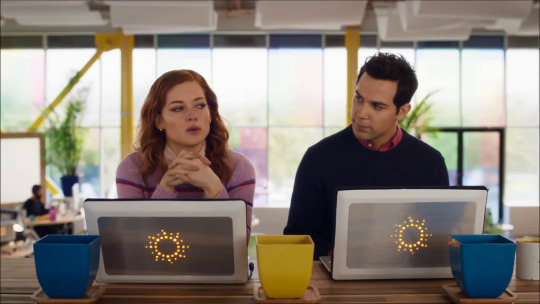
My take on the storyline: “The Love Triangle”
Good news for one team, perhaps not so good for the other team.
Based on everything we’ve seen on the show (the storytelling, the promotional materials, the spoilers)... everything points to Max/Zoey being the endgame. I’ve seen many fans (both those who support Team M & those who support Team S), say that they get the same message from the storytelling. It does seem to be the clear message from the show...no matter how they get there..or when...
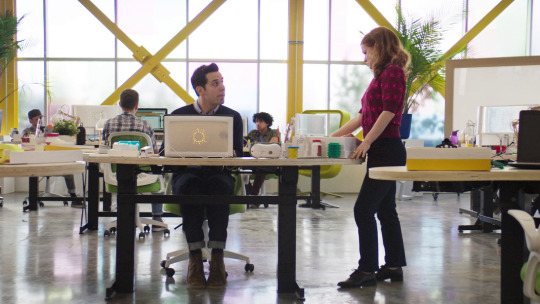
The “proof”:
First: The actor who portrayes Max is billed higher (probably mostly cause he’s done more well-known musical projects before than the other actor), and he’s featured in much more promotional materials (promo pics, posters, promo videos...) and in more central role, than the other actor. The promotion is vastly focused on M/Z. They use those characters & actors... a lot...for promotion. That suggests only one thing.
Second: They told us the premise of Zoey’s future relationships in the Pilot already via this Max/Zoey conversation:
Zoey: I have a long history of --- what do you call my past relationships again? --
Max: -- “Unnecessarily complicated, exhausting for everybody, the opposite of good”?
Zoey: Yeah. Those things. Which is why this time I'm just gonna take things slow, and wait for the right “in”
And with Zoey/Simon thing has been just a repeat of her past experiences which she claims she doesn’t want to re-live again, and this show is all about her growth as a character/person, this cannot be the endgame. Even if they’d reveal that S/J have broken up... all that’s already happened has followed this exact description (see Max’s quote)
Third: While Zoey sang her heart song to Max and they had a moment for themselves (though..let’s be honest...they get interrupted so much that others in the office must’ve overheard a lot by now...), the heartsong to Simon seemed to be more like a setup for having Max see it. And while both songs are about her deepest, secret feelings/desires... and there’s truth in both, then the way the scenes were set up makes it seem like she sang to her best friend to make him aware of how she really feels (what he said in the previous ep: he needs to know/get a respose from her...and this gave him that). But the other song was meant to be overheard by her best friend...and that was the goal of the song/scene (not the song itself, but that he saw). Again pointing to the show going for Max as the endgame.
Fourth: The triangle is as follows: Both Max & Simon like Zoey, but she only really likes one of them. Both men sang heart songs to her (Max = I think I love you, Sucker, If I can’t have you, 500 miles), and she sang to both...but different songs. Simon sang “If you say that you are mine, I'll be here 'til the end of time” in 1x05, so it’s coming from his side. Zoey in 1x08 sang "I'm Yours” to Max (that her heart is his), but she sang “I want you to want me” to Simon (not that she wants him, but she wants him to want her). As her best friend explained it - one is about love, the other physical attraction. But... if you listen to the lyrics more closely then based on them she’s singing about how she saw S. crying & all alone (1x01) and how that affected her, compared to singing to M. how she’s “caught feelings”. So she’s only actually interested in Max, as her feelings for Simon are not mutual (beyond the grief bond). One is one-sided and more “superficial”, the other is mutual and more “serious”.
Fifth: While we’ve seen that Zoey thinks she’s caught feelings for Simon (what she told her mom at the engagement party), and she hasn’t really admitted this to anyone besides her mom, she seems to not see it as a good thing. She also claims to both Max & Simon that she doesn’t really have feelings for Simon/wasn’t aware of her feelings and/or that she’s basically over it... so kinda “little white lies”. She seems to think they have a sort of connection and/or she seems to find him attractive...despite realizing that it cannot happen because he’s engaged. (and before Simon went and took the wrong step, he said the right thing - they leaned too much on each other about their grief, and they should just go back to co-workers, and that’s all. Sadly...that was changed because of the “glitch” that mislead...people). But... we also saw that she is fighting against having feelings for the morally questionable engaged man, cause she probably realizes it’s a bad idea.
Sixth: All this time, but especially in the last episode, the show has tried to show the two men in her life differently, and show the differences in their “relationships” with Zoey. It’s a very classic “fairytale story” that follows often-used “clichees”. They’ve shown how the two are different, and how the connection between both “ships” is different. And everything points to them starting to make the difference even more clear. By now they all are aware of each others feelings...to some point... and both men are aware that they’re both competing for her interest.
And she’s aware that she is interested in both... but in different ways, and for different reasons. And again they used Max to vocalize the choice before her - will she choose physical attraction without deeper connection or love and deeper emotional connection...AKA “new attractive co-worker who went through what shes going through VS her best friend, who is always there for her...no matter what. The options were made clear, now it’s her decision. And it’ll depend a lot on how each man will act from now on...at the most difficult time in her life (she’s now really going to lose her dad).
If Simon will try to make advances based on the heart song she sang, which gave outmixed signals AND at the same time Max will continue being a good friend (as we saw in 1x08...despite their dispute) then that’ll make Z/S grow furher apart and Z/M grow closer. And since it’s all become too complicated and messy for everyone... then it’s very possible all this will get to Jessica, and break those two apart. But... that’s IMO gonna be the opposite from making the path clear for S/Z. To have Simon as a character grow they need to have him deal with his grief, and all that. The Simon vs Max thing is a lot like Leif/Tobin thing... where the peer reviews made one become sketchy and start playing games, and the other start working on bettering themselves. I expect similar differences of paths taken for S & M. Especially because we’ve not only seen Tobin 2.0, but also Max 2.0 (and we’ll see more of that..in coming eps)
Seventh: We ve heard spoilers than in the S1 finale there will be a “heart song” for/from/with one of the two and Zoey. From how the scene is decribed it sound more like something fitting to Max (Max/Zoey). Which fits with how the season and story has been built so far. That seems to also confirm where they’re taking it. Cause...they’ve established that just like on most shows the main character HAS TO have a love interest, and so far they’ve only introduced two options.
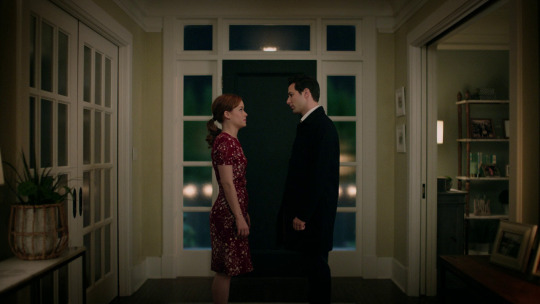
Other reasons why Zoey will most likely choose “love” over “physical attraction”:
We saw Zoey’s reaction when she found out that S. had a SO/was engaged - she ran. And though she might find him attractive (physically)...as she found out via her heart song in 1x08, and she might feel a connection to him (because of the heart song she heard him sing in 1x01), she hasn’t shown interest in actually being with him... because she knows he’s taken. And also because she’s not really in the right place to start a relationship. She/They may not realize it, but they don’t have much more in common than grief - that’s the center of their bond (for now). Despite her interest/attraction to him & her thinking she “likes” him...
This is also why it’s easier for her to admit she has/had feelings for Simon, but she’s having trouble admitting...to herself (and Mo) & to Max that she may have feelings for her best friend. There’s nothing to lose with the first, but a lot to lose with the second. She’s afraid (and she varbalized it at the end of 1x07) that something could not go well... etc
While Max was not at all ready to meet his dates (Autumn) parents, because it’s a huge step and he just wan’t ready for it, he has met his best friends parents, and is welcome at their home. And there’s no feelings of meeting the parents being such “next level step”. We saw this when he brough her dad pudding to eat & when he helped carry the bed downstairs. It was also mentioned that he’s been part of the extended family for a while - welcome to family events (Christmas, barbeques..). Zoey’s father - the most important person in her life until now - is definitely on the man’s side, who brings him pudding (cause he’s paid attention that he can only eat soft food) and visits him & helps out. And her dad’s opinion is very important to Zoey, so...
She is completely at easy with Max seeing her with a facemask on, eating take-out, alone, at home, but she hides it (the true self) from Simon. She wears “a mask” with Simon, but doesn’t with Max. Same with how she didn’t tell Simon about her dad in 1x08 (brushing it off: hospital = lollipop), while telling Max that her dad had an apointment that morning. And though it did take her time to find the courage to tell him about it all in detail, she did..in the end. But from the start she shared the main info even if she didn’t tell what exactly happened and how she feels about it. She didn’t completely brush it off with him...even if the news made her unable to process and share it...right away.
We saw how she resisted her personal heart songs to Leif/Joan & to Simon, while being completely at ease with singing them to her best friend (Max) and her dad (Mitch). Cause if we leave out the big dance numbers (Crazy, Pressure), then she tried stopping herself from singing the others...the personal songs... and/or apologized for what’s to come...with Simon, too. But with Max (and her dad) the song just came to her...without the need to apologize or resist it. And afterwards she just tried to claim it didn’t mean as much, because she’s just in denial (and not really ready to start a relationship...because right now she is going through stages of grief). There’s a huge difference in both the heart songs she sang & HOW she sang them.
And we’ve seen that she really appreciates him as a friend, and as she told him - she can’t lose him as a friend...she needs him in her life. She cares about his feelings. She is afraid she gave him the wrong impression, she runs after him to explain things to him, because she knows that he got hurt. She actually cares about him...and is feelings (as a friend). And they’ve not shown the same reaction with Simon. And though the friends to one-sided to more-than-friends trope is “an overused clichee”, it isn’t necessarily bad. It can work well. Examples: Mondler on Friends, Peraltiago on B99...
Max may have the advantage of having known her longer, and knowing her better (because they’ve been friends for 5 years), and hence she’s more comfortable around him. And...that’s the reason why she let him in on her superpower secret, and why she tells him about...things. But... that’s precisely why she should and will choose Max over Simon. (He’s been there for her...always...and he continues to be there for her...through this hard time in her life.)
We saw how even though he was upset with her (for keeping secrets from him, from setting him up with someone else when she knew about his feelings for her...just because she didn’t dare to be honest with him & communicate...and hearing her sing to another person, too...) he was still there for her. A shoulder to lean on...literally and figuratively. He came to her rescue when she put her job at risk (singing Pressure), he gave her her mom’s message and supportive advice regarding her dad... And though there’s a hint of competitiveness that he seems to feel after the 1x07 elevator end scene (where we saw that both men seem to think they’ll be the end choice), and him wanting some kind of response from her, the 1x07 end scene and other moments have shown us that he’s willing to wait til she’s ready.
Especially...since in 1x07 he felt like it’s unfair that she can see into his heart and knows how he feels about her, he doesn’t. But in 1x08 he got to see into her heart (because even though she’d promised to always be honest with him from now on... she wasn’t fully... for a bit... and the “glitch” made her break her promise...til the evening), and it’s more “fair”. He now isn’t as in the dark, and less uncertain. I think the glitch was good for him, because he now knows how she really feels. All he wanted was an honest answer. And though it’s undertandable that he’s a bit hurt by what he’s heard & seen lately... but in the end it was beneficial. As Mo put it... he deserves an answer...no matter what it is...
I get the feeling that by now Zoey’s actually aware that she has feelings for her best friend. She might’ve not been aware of it all until he sang the first heart song to her, but after that we’ve clearly seen that she has either started to realize she actually has feelings for him or that she’s started to have feelings for him. She showed signs of jealousy when he was with Autumn (seeing them talking at the coffee shop, dancing at the club...). She couldn’t stop staring at him when she walked in during the Mo’ Makeover...indicating clearly that she finds him also physically attractive. Not to mention the emotional connection, and friendship. All the looks she gives him, her song & dance during “I’m Yours”... all for him...
And she cares about his feelings & not hurting him (running after him when he sees her heart song to Simon...) The look she has, when he brings her dad pudding & when she sees him with her dad or when she hears him sing “500 miles”, or the looks and giggles when she sings her heart song to him.... While she’s in no place in a relationship at this time, I think she’s realized that despite her grief and emotional state she’s developing feelings for her best friend. And that... just like what’s going on with her dad, seems to scare her.
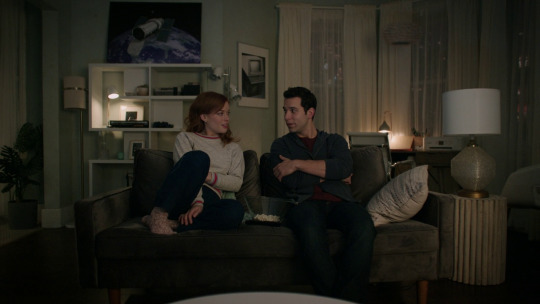
MY PERSONAL TAKE/THOUGHTS:
As human as her feelings for Simon are (you can’t control who you find attractive...), and as much as this can happen IRL then Zoey/Simon is a no-no... simply because of his relationship status. Cheating storylines are not cool. Hence I cannot stand behind that “ship” or the possibility of accepting them as a viable possibility. IF he didnt have a fiancee, he’d be a candidate, but that’s not the case...he has a SO. Hence Team Simon cannot even be an option. No matter how much they try to promote it all as a love triangle & no matter how much they make Simon make bad decisions and wrong moves (going to her place & talking to her about his feelings, kissing her) seem “nothing serious”.... it’s wrong. It’s just as her best friend decribed it in 1x08. If things were different, yeah, but we’re not talking hypotheticals.
So IMO there’s one clearly wrong choice netween these two. I mean... I would not care if they would have her stay single, or develop new interest (Tobin)...as long as it’s not “morally questionable”. Z/S would be like Joan/Leif... sketchy, and wrong. And hopefully having seen those two helps Zoey understand that.... see the parallels (she has a hint that one is playing the other)
As for “Max is being too pushy”... here’s how that goes: he’s been in love with his best friend...for some time...and not said a thing. She accidentally finds out after she gets her superpower. And all the while his feelings seem to grow deeper. And now that she’s aware of his feelings, it seems she’s become more aware of her own (similar) feelings and/or she’s developed them. And sure...after his peer reviews (that “he doesn’t show initiative”) & seeing that his best friend is interested in someone else...who would be just another “not good option” similar to her past bad relationship decisions, ...and after getting mixed signals from her, he made more direct steps.
He sang her his heart songs, but he didnt push her (no, “Hand picked” is not like a date, just “are you free to go and eat”). She only felt pushed because she could “read his mind”. Also... he didn’t sing to her while being in a relationship with someone else...he kept his distance. And at the same time she seems to have become more and more aware about her feelings for him, and she was giving him “wrong signals”. His response - the flash mob was a response to that. And he was just upset that she ran...without any real response (not interested, can’t right now...cause I’m too occupied with dad thing). All he wanted was some sort of respose, and he told her so. She avoided telling him how she really feels (as Mo put it... he’ll understand if you say you don’t know, but you owe your friend an answer)...delaying it...as long as she could.
Also... any rational person would be confused about hearing that someone has superpowers. Again...she avoided giving him an explanation, instead telling him “fairytales of superpowers”. And in the end he was okay with her answer - that she can’t give him an answer at the moment. Even though he was upset, we saw he was still gonna be her friend (even if keeping some distrance, and not doing the movie nights), and that he was sure that one day she’ll be ready (the 1x07 elevator end scene, where both men think she’ll choose them...in the end..when she’s ready)
And in the latest episode we saw that no matter how hurt his feelings were, he did not stop being her friend. As he said “he’ll be there...always...and be the shoulder to lean on”. And you could tell that a huge weight was lifted off his shoulder when he knew her real feelings. When she did what she promised in last episode...be 100% honest with him. Sure... it only happened because of the glitch, when she sang him the heart song, but nonetheless it made things more equal. As he said - it’s unfair that she knows how he feels & can see into his heart but he cannot see into hers. The glitch changed that. Gave him the opportunity to get the answers she “owed him”
So... it’s undertandable that he felt hurt and confused when he saw her sing a heart song to someone else... right after finally giving him some answers. But...during he same conversation he processed it all, and also explained it to her - one song about love, the other about attraction. And he didn’t say “choose me”, he just explained the meanings to her (cause it was obvious she didn’t understand it herself), and told what his choice would be, while saying that he knows she’ll make her decision on her own....cause that ’s what she’s like.
As a friend he doesn’t want her to make the same mistakes she has in the past..hence him being “upset” with her. Cause to him it looks like she wasn’t completely honest (something she promised to be) with him - singing her heart feelings to him, and then to someone else. Claiming that she can’t lose him as a friend and that’s why she’s not ready to try being more than friends, when to an outsider it looks like the real reason is, as he put it - cause she’s confused about her feelings... for two people. All she’d have to tell him...from start... would just be honest and simply just say (more clearly) that she has to focus on her family & dad at this time, and ask for time. She kinda did at the end of 1x07, but because she’s not good with emotions and feelings...and she delayed her answer, she didn’t really let him in...and be the friend she needs at the time, it wasnt as clear as it could’ve been.
So far all his “pushy” behaviour can be seen as being a good friend - he’s trying to help her not start another overly complicated relationship...which she told him (in Pilot) is not what she wants anymore. He points out to her why Simon is not a good option - he’s taken. Yes, part of his “pushiness” seems to come from trying to be less what his peer reviews decribed him like & competitiveness (knowing Simon is kinda his competition). But from his POV... (before she told him about her superpowers& sang him her heart song)... she’d been shown more interest in him (checking him out, giving mixed signals) & at the same time he’s in a bit of hurry because if he doesn’t act soon she may make a move on the new guy/the new guy may make a move on her. So it makes sense that with all of that happening at the same time he seems...to some... to "push” her towards being more than friends... Cause unconciously he may realize that if he doesn’t make a move ...now... he may be too late.
And though it all... he’s still there for her. He might be “mad at her... just a bit”, but he still goes to check on her, still gives her advice, and space... after he knows what’s really going on. (he “pushes” her to confont her feelings about her dad, and deal with it instead of running). He’s not looking for something in return. We saw that over and over in several episodes. He verbalized it in 1x06, and his face/look told it in the end of 1x07 elevator scene.
Also... “Mr Nice Guy” is better than “Mr. Cheater”...any day... in my book. And it surprises me that there are those who think that “nice guy who goes after his best friend” is worse option & worse clichee than the “hot new guy, who is willing to cheat”. For me one is clearly wrong behaviour the other just depends on your preferences.
To quote Mo : Max is funny, and funny always wins. Hence... being Team Max.

So... while up until things got overly complicated, both men could’ve been options, by now the show (writing etc) has made it pretty clear that they’re going for Z/M endgame.
Though the showrunner/writers at times love to focus on the “love triangle” (I still don’t see it in the writing...I only hear it being described so by the showrunner etc), and how they want to continue with that...for a while... which makes it seem a bit like they’re seriously pro “cheating plots” and “human feelings are messy...hence we let the main character continue making bad choices” because “we love the love- triangle drama”, there’s still more evidence in them not really taking it further than the kiss. But yeah... at times the showrunners comments make it sound like he thinks more like the HIMYM creator did and less like Dawson’s Creek creator did. Too fixed in loving the “triangle drama” & not going for character growth... But... I truly hope that all that has just been misleading...and the storytelling is what tells us how it goes.
They already let Simon make a bad move - the kiss. That should be the line over the line that they won’t cross again. He may continue pursuing her by singing songs to her, because he read her heartsong in the wrong way (because he doesn’t know why she did it, and what’s behind it), but if they follow the character growth path, and their current direction... they won’t let him/her go into the “cheating plot” territory again.

My “advice” to Zoey & Simon:
IF I could talk to these fictional characters, then the advice I would have given them...weeks/months ago would have been: just talk to your family & friends...the important people in your life. That’s Jessica for Simon, and Max (Mo, her mom...) for Zoey. Luckily we finally saw Zoey do that in the latest episode. So far we haven’t seen her really share the specific details on her dads health & her feelings regarding it all, with him. She hasn’t really confonted her feelings about it...til now or really confided in anyone in her family...etc... until now/finally. But Simon doesn’t seem to be doing so (he kept it all inside for a long time...until he had a chance to talk to a stranger, Zoey), and even though he made a point to not talk to her about it all, there has been no indication that after the “smoked roses” incident he’s confided in the person he should, Jessica.
Because... it doesn’t take a shared experience to get the support you need. The other person doesn’t have to have lived through the same/doesn’t have to know what it feels like in person to be the right person to lean on. And that was beautifully showcased at the end of ep 1x08, when Max, after he had been told about her dad’s condition, and her feelings regarding it, was the emotional support she needed. It just takes one person - somone who knows you best/well... to help you nagivate your “grief”.
To elaborate: That moment, when she finally was completely honest with Max, and let him in on her dad’s situation, was very important. It was the step to right direction. It also showed Zoey & us that it doesnt take a person who has experienced the same to understand her, support her. It just takes one person, who knows you & is there for you no matter what. And we shan’t forget that since Max was also close with Mitch, he will be personally affected by her dad’s death. So a shared experience... shared grief. Max being “in” on the details means that they’ll lean on each other more on this (so less need fo Zoey to connect about grief with Simon...who doesn’t have a connection with her dad & who doesn’t really know her). It was a crucial moment: Zoey finally not running from it all & properly starting grieving (going through the stages). And she finally let someone really in (something Simon can’t/won’t do with his fiancee... both cause she doesn’t understand him & his not willing to let her in), so this will make their friendship stronger going forward. Meaning: she doesn’t need Simon fro grief bond - she can get that support from Max, too.
And they really need to explore Simon’s character...and let him grow. Based on spoilers we know that were gonna get (finally) some more development and closer look into Max. But they need to look into S. (Is it just the grief? Is is something...more...)
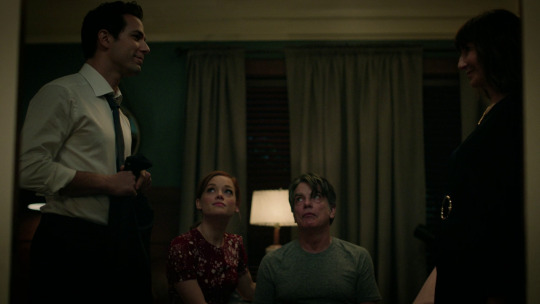
wow ..this turned out way longer than I expected and planned.
Also... no ship wars comments, please. Even though I stated why I prefer one of the options the show has introduced that does not mean this is an invite to start discussion which is better. This is not the purpose of this post. You’re allowed to have your preference. For me there simply is a (single) reason why I cannot support one, while am OK with the other.
THE END
#ZEP#long post#text post#speculation#theory#analysis#Max vs Simon#THIS IS JUST MY TAKE ON HOW I'VE INTERPRETED THE STORYTELLING...SO FAR#ZOEY'S EXTRAORDINARY PLAYLIST#ZOEYS EXTRAORDINARY PLAYLIST#ZOEY'S EP#Zoey Clarke#Max Richman#Max x Zoey#Zoey x Max#Jane Levy#Skylar Astin#TEAM MAX
102 notes
·
View notes
Text
An Opinion Piece on Vis A Vis: A Bittersweet Goodbye
The start of a new decade marked the end of our beloved series, Vis A Vis. I can feel the 'post-series depression' already; in other words, that empty feeling at the pit of your stomach once a show has ended. In fact, I feel as if it has tripled for this series specifically, because of the three different time periods explored in the five seasons and the consequently different reactions I had to each period. Let me expound.
Seasons 1-2: What won me over initially
What really won my heart over with this show was Macarena's evolution during her time in prison. Initially, she was innocent, naïve, and defenseless, often finding herself at the mercy of Cruz del Sur's many villains; such as drug-trafficking Anabel, closeted pedophile Sandoval, and of course, the ever-scheming Zulema. A common theme was her constant need to be saved or protected; this was evident in almost all of her relationships - with her parents, her brother, and love interests Rizos & Fabio. We later find out that one of the reasons why she decided to be with Rizos was because she felt alone and afraid. Her feeble attempts at survival were frustrating; you wanted her to be stronger; you wanted her to push back against her bullies and win. You wanted to see a protagonist with confidence.
Because it took her the entirety of the first season to do this, her eventual dominion of Cruz del Sur in Season 2 was intensely satisfying. She became a better survivor: through boxing, she found a cathartic outlet and used her newfound physical prowess to overcome Annabel's thugs when they came to permanently deafen her with a wire in the bathroom. She became secure - or at least, so we thought - in her evolving identity, embracing her bisexuality as she fell more in love with Rizos. She bought Bambi from Anabel to put an end to the latter's remorseless abuse, and offered love and affection to Rizos upon discovering her rape by Valbuena; for the first time, we see Macarena as the protector instead of the protected. But this show wouldn't be emotionally complex if her character's development was so perfectly absolute: she was still reliant on Fabio, confusing her desperation to escape prison with feelings for him. Her shock at his deception, however in good faith, coupled with the news of her mother's death, witnessing the cold-blooded murder of her father, and becoming a murderer herself, triggered a spiral into darkness. It was a beautifully tragic display of the destruction of her initially strong moral compass. She turned to drugs, ended her relationship with Rizos in the most heartbreaking way, and isolated herself from the other inmates. This change in Maca was something I was excited to see play out in seasons 3 and 4; I wanted to see her redemption arc. However, due to conflicts in schedule, the actress that players her, Maggie Civantos, was only able to play Maca for a mere five episodes across the two new seasons. While the actress cannot be blamed for this, her departure led to a string of creative decisions that, in my opinion, slightly compromised the quality of Seasons 3-4.
Season 3: A decline in quality...
The first criticism stems from the time jump from Cruz del Sur to Cruz del North; there were many cliffhangers left unaddressed. Specifically, they were reactions we didn't get to see, such as Sole finding out her husband, Fernando, was murdered; the inmates finding out that Saray got pregnant, and of course, more importantly, the change in Maca after she decides (at the end of Season 2) to go back to prison instead of running away as a fugitive. The absence of these scenes automatically undermined our emotional investment in the show and created a misalignment between the reaction of the viewers and the non-reaction of the characters actually living out the story. Additionally, many key characters were so dependent on the development of Maca's story, that Civantos' departure from the show necessitated an abrupt end to their storylines (i.e. her brother Roman & prison guard and love interest Fabio), which felt contrived. Even more forced was the relationship between Rizos & Inspector Nerea: similar to Roman & Fabio, Rizos' character was so dependent on Maca that it seems like the writers felt pressured to "recreate" their romance with someone new. Not only did this spectacularly fail, as her short-lived relationship with Nerea felt rushed, disingenuous and random, but it also cheapened Rizos in the sense that she became one-dimensional, only capable of pursuing relationships recklessly and nothing more. This was confirmed implicitly by the writers, as throughout the two seasons, they struggled to give Rizos anything meaningful to do and gave her the most dissatisfactory ending of all the inmates in the finale. I found this extremely disappointing because I enjoyed her character's story arc in the first two seasons. In the same vein, enter Mercedes, who replaced Maca as one of the protagonists in Season 3. Her story and eventual demise was fruitless: she was not charismatic and did not form relationships with any of the inmates, the latter point I think being a crucial mistake on the part of the writers. So while they believed they upped the ante by giving her a brutal death, honestly, I don't think anyone cared much. We simply wanted Maca back.
Season 4: ...Redeemed by our favourite villains
While Season 3 was a far cry from the quality of the first two seasons, arguably Season 4 managed to redeem them. First and foremost, was the character development of our favourite villains, Saray and Zulema. While Zulema was the perfect villain in the first two seasons, I worried that her relentless need to escape prison made her predictable. By introducing her secret daughter, Fatima, and her estranged mother, this changed Zulema's dynamic entirely: whereas we once saw a cold and calculating criminal who would do anything and kill anyone to break free, we now saw a woman jaded by the injustices and traumas of her past. We could relate to her that much more. Watching Zulema fall to her knees, begging Sandoval to stop the rape of her daughter, was one of the most powerful scenes of the entire series, because a compromising Zulema seemed so unfathomable before. The chilling murder of Fatima was matched by an inflamed Zulema, and her passion as a mother finally eclipsing her need to escape was a well-developed, well-executed arc. We have a similar situation with Saray; with the birth of her daughter, instead of her sporadic episodes of violence, she channeled her passions into her newborn. The scene where she had to say goodbye to Estrella, as well as that scene where she showed her to Zulema as a way to make amends, were so tender, and beautifully contrasted with her previous tendencies to rage at the smallest things. This was of course helped by the gentle refrain of the soundtrack playing whenever Saray and Estrella were on screen together (as a side note, the scoring of this series was consistently excellent; the melancholic melodies foreshadowed the inevitable tragedies of the characters onscreen. Other standout examples include the melodies played during Maca and Rizos' intimate scenes, and Fatima's theme.) Additionally, the fact that it was Saray who had the courage and heart to mercy kill Sole, just emphasized the growth of her empathy and the change in her character.
One cannot mention Season 4 without bringing up the tear-jerking reunion between Rizos and Maca. Watching them stare at each other in disbelief after not seeing each other for eight months was an incredibly emotional scene. Even Civantos admitted during an interview that that scene was "the most beautiful scene in her entire career". Seeing their chemistry made me lament even more the absence of Civantos throughout the two seasons, as I would have loved to see that familiar push and pull in their relationship playing out under the different circumstances of Season 4, and particularly, a more hardened and jaded Maca. Nevertheless, this reunion scene was arguably the best that the writers could've given us as closure between the two, so I applaud them for this.
Ultimately, there were a number of dissatisfactory decisions made in Seasons 3-4, but they were still very entertaining seasons. It is important to note that the episodes were more or less twenty minutes shorter than the episodes from the first two seasons, so I can understand the limitations that placed creatively on the writers and directors on top of having to work around Civantos' departure.
Vis A Vis: El Oasis - A grave injustice
So what made Vis A Vis successful? The evolutions and relationships of the characters, both protagonist and secondary. How every character existed purposefully, with a backstory we could empathize with. The constant battle between morality and survival. El Oasis, unfortunately, failed to capitalize on its predecessor's strengths, bringing nothing new to the lives of our favourite characters. The storytelling was convoluted and often times confusing; at best, the episodes evoked feelings of dissatisfaction within the viewers. Ultimately, most fans will dismiss this spin-off as a consequence of being exposed to the deserts of El Oasis for too long: a mere hallucination.
My first criticism concerns how little actually happened over the course of the eight episodes. My reaction after every episode was the same: I'd process the story unfolding, then get shocked when the (approximately) 45 minutes would already be over. So much time would pass, and yet there was so little exposition. Each episode would leave the previous episode's questions mostly unanswered, and gave rise to even more questions. I realized quickly this was due to the unnecessary increase in supporting characters, with close to no development of backstory. For instance: how did Zulema know Ama? Ama's confrontation with Maca was so brief, and she ended up killing herself. As one of the villains, it made the build-up of her character pointless. What was the point of Flaca? She spent most of her screen time bleeding out only to be killed. You could argue it was to show that high-stakes heists inevitably have risks and collateral damage. Well, sure, but I don't think people cared much for her character because they gave us nothing to care about. Who was she to Maca but someone who occasionally chimed in on Maca's contributions to their therapy sessions? What was the point of the school bus full of kids visiting El Oasis if they were all just going to be let go so easily by Ramala's henchmen? You could argue it was to reveal Goya's past with bullying, when she intervened and beat up Eric's bullies; or it could be because Vivi needed to meet someone that felt isolated like her, to give her character more dimension. Either way, both reasons feel contrived. If something cannot be justified naturally, then it feels forced. Cepo, Goya and Triana were all interesting supporting characters, so it felt like such a waste that their characters weren't given anything interesting to do.
What also elicited questions was the very disjointed narrative: there was a constant jumping of timelines mixed in with flashbacks, so nobody ever really knew when anything was happening. Doing that without properly developing the events actually occuring at that present time had the dual effect of leaving the audience confused and made us feel emotionally detached from the plot and the characters. Most significantly: how did Maca and Zulema go from taking cute polaroids together and Zulema calling Maca her home, to them wanting to turn on each other? Instead of expounding on important plot points like these, the audience was given fillers with non-essential characters. What is the point of making a spin-off dedicated to the relationship between Zulema and Maca if their story was going to remain underdeveloped? Additionally, a fan online calculated that they only got 30 minutes out of over 360 potential minutes screen time together; that is only 8%. It is no surprise the fans were extremely disappointed.
Moreover, underdevelopment came in the form of stasis, or a state of inactivity. A majority of the season saw the protagonists waiting around the hotel, which was honestly boring. For instance, we saw a number of episodes where Goya and Triana were essentially just watchdogs over Kati, and nothing more. This was worsened by the use of dialogue. In earlier seasons of Vis A Vis, dialogue was one of the main drivers of the plot; in El Oasis, not unlike the supporting character fillers, not much what said, and when things were said, they didn't add much to the story (save for a few exceptions). It made the actors' acting seem flat, which is unfair to the actors as we saw their moments of brilliance in the earlier seasons. Additionally, a stylistic choice that pervaded El Oasis was the drawn out moments of every scene; for instance, when Zulema looked over Ama's dead body in the desert - that was given a whole five minutes of screentime. All these points hammer home the idea that while things were happening, they were 1) things that did not do much to drive a compelling plot and 2) were things the audience did not care about. It is clear the writers were trying to be different from the original series, and also tried to do too much. As the saying goes, "If it ain't broke, don't fix it." Arguably, they failed on both accounts.
Finally, the finale itself warrants its own paragraph of criticism. The most glaring flaw was the way Zulema's death was executed. In the promotional videos leading up to this finale, we hear Zulema say to Maca: "igual en la vida, igual en la muerte" i.e. equal in life, and equal in death. This was an idea initially introduced by Altagracia in Season 3. Thus, Zulema dying while Maca got to live was not consistent with what they were teasing in their marketing materials. Still, one could argue that Zulema had to die because she had terminal cancer anyway, and this would be her epic redemption arc. To which I would I concede that yes, this finale could have been satisfactory and logical even with Zulema's death. However, the manner of her death was inconsistent with her character. Throughout the series, we are made to associate Zulema with a scorpion; as a "bad bug that never dies." Zulema had an intrinsic need to survive, no matter the cost. So even if she ended up dying, there was no way that Zulema wouldn't have plotted to at least attempt to survive, whether that be a scheme involving a fake death or even in her actual death scene itself where we saw her putting her guns down in submission to Ramala's henchmen. In the same vein, it did not make sense that, upon realizing Zulema was sacrificing herself for Maca and her unborn baby, that Maca replied with a simple "Gracias" and ran away. There should have been one of two options: a scuffle with Zulema, wherein she refuses to leave her there alone to die. Or two, a scene where she is speaking to her son about Zulema's legacy. The absence of these key scenes disrespects and almost overtly disregards the very complicated and rich relationship the two had together, as if all they had been through meant nothing.
Overall, the spin-off unfortunately did not do justice to the story, the characters (both lead and supporting), the actors and the fans, the latter insisting on alternate endings to get closure on a story we have been following for five years. It is true that when many shows end, it is not possible to please everyone. However, I believe that the majority of the negative reviews of this spin-off could have been avoided.
In conclusion...
Ultimately, the hollowness in my chest is bittersweet: on one hand, it is telling of how emotionally invested I became in the show and its moments of brilliance, and on the other, it speaks to the disappointment I felt with the spin-off, because I had such high expectations. Regardless of the ending, however, this show will stay with me forever. I have loved experiencing romances, struggles and adversities with these characters. I have enjoyed watching the evolution of our protagonists, whether it be through redemption or a gradual descent into darkness. This is a show I will recommend to anyone, over and over. #MareaAmarilla
#visavis#series#tvshow#spanish#spain#lockedup#review#opinion#najwa nimri#maggie civantos#alba flores#berta vazquez#itziar castro#mareaamarilla
38 notes
·
View notes
Text
Perspective: Did Villanelle’s character arc in Season 3 get lost in translation?
Killing Eve Season 3 became something of my object of fascination by the odd disjointed experience I have watching it. It feels like it makes sense at first, but the whole lot is rather off. The more I revisit it, the more it appears that what we see on the surface is but an attempt at telling a very different story. But precisely by failing to convey their intended story (Or not committing to), the authors inadvertently created a slate with enough inconsistencies that it fits any rationalization the audience wants to impose on the final product. Its lack of clarity and internal logic made it adaptable to several points of view. I can impose the interpretation that Villanelle was given an irreconcilable redemption arc, or that she is still a psychopath and it will still somewhat work.
However, when the season is consumed stripped from our expectations, there is a dissonance between the narrative and the other elements of storytelling which sends mixed signals, especially in the most developed storyline in the season: Villanelle’s character arc. In the midst of this confusion and inability to get a hold of the character, I tried to grasp the intent of the author instead of the material itself. Upon reading interviews with Suzanne Heathcote, Sally Woodward and Jodie Comer, many of my initial interpretations of her arc were challenged. They seemed to never seek to rectify Villanelle’s psychopathy or nature, but to explore her deep need to belong. There seemed to be an awareness towards the truth of the character, and the journeys they have been on so far. It appears that their idea is that her impulses are her true self and the tension arises from the inescapability of her own nature and its exploitation, which becomes the sole designator of her worth as a being. This is indeed much more interesting than what I initially interpreted. So, I want to revisit Villanelle’s character arc with new eyes... in more detail... and see if I can find something new.
Villanelle’s initial motivations set-up a “ Self-affirmation” arc, not a Redemption arc
Initially, the show seems to set two main motivations for Villanelle: a search for autonomy and a search for belonging, which will prompt her desire to become a keeper and find her family. Objectively, her motivations set up a journey for authentic self-identity.
The opening wedding sequence is a good way of introducing her search for autonomy. Six months after Rome, Villanelle is gold digging her way through life, still very psychopathic of her. This is the first time we see Villanelle exist without a parental figure and without the tight control of ‘The 12’, and it turns out she is doing just fine. Where her wedding represents her agency and autonomy, being dragged into ‘The 12’ by Dasha has her sitting in the back of the car like a moody toddler. Her relationship with ‘The 12’ is infantilizing, controlling and coercive. It does plant the seeds for her struggle by visual storytelling, which I dismissed for a silly comedic effect.

Villanelle seems more aware of the power plays behind her bargain to come back, contrasting with her previous aloofness. This time, she seems keen on cutting her own part of the deal which is to become a Keeper (which oddly never involves getting the names of ‘The 12’). Her request is so absurd, and their agreement to make her a keeper so obviously fake, that it shows how Villanelle is truly unaware of the magnitude of what she is dealing with and how little leverage she actually has. But her effort to carve some degree of freedom and agency within her world is an authentic motivation. Her overall disinterest for the job also helps to solidify the idea that she is dreading being controlled, and only agrees to perform the kills as part of her promotion process. Which should not be confused – although it easily is – with a lack of enjoyment in Killing. In fact, Villanelle thoroughly enjoys herself in the kills she performs before Episode 5, be it improving on a relic, stealing a baby, or scaring hiccups away. Villanelle isn’t opposed to killing, she is tired of being ordered to kill. As welcomed as this development is, in many moments her motivations could be mistaken by childlike Villanelle just being capricious.
Parallel to her self-affirmation comes a search for a sense of belonging. This is a deep foundational motivation for the character that had always been in the subtext of the show. There is a fascination towards family and normal life in Villanelle, that she tries to recreate with those she “loves”. Arguably not even the character can articulate this urge, so when Season 3 sets to explore it, it feels forced. Villanelle seems intrigued by the gratuitous affection the baby elicits in people, including those that don’t own it, leading her to kidnap the baby as an experiment, then literally toss it away. It did not elicit in her the gratuitous affection it elicits in everyone around her. She is a psychopath. When the baby is reunited with their father, she is once again puzzled at the happiness in the dad’s face. The baby belonged to him. Did she ever belong to someone? This question will lead her to seeking her own family, taking her to Russia.
Being so far removed from the events of season 2 and considering that Konstantin and Villanelle’s scene was completely overshadowed by the subsequent events, I found it hard to add weight to this motivation. A large part of the audience is understandably eager to learn about Villanelle’s past, however there wasn’t enough development to justify why the character wanted to learn about her past. Instead, she enunciates her newfound fascination with babies, without elements or events to convincingly move the character in this direction.
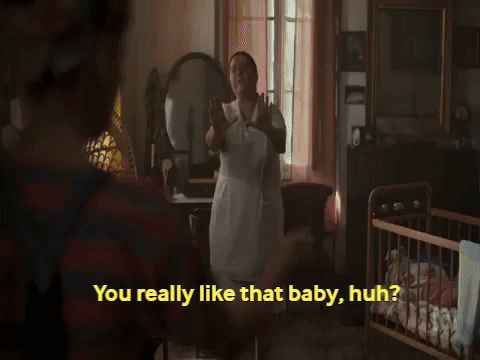
Villanelle’s journey home: nuanced and conflicted story telling got lost in translation
I have broken down how I believe this episode not only retcons her background, but soft retcons Villanelle’s psychopathy and her entire character – and I still believe in practical terms it inevitably does - but it’s a shame, because the episode in itself doesn’t. It’s all about perception and expectation tainting interpretation. The writer’s original idea was to have the audience go on a journey with Villanelle to this disconnected corner of the world, as she is surprisingly charmed by the oddity of what she finds. It was the perfect escapism from her claustrophobic world of ‘The 12’. We wrestle with the nature x nurture question as Villanelle wrestles with it herself, we feel at home, we connect with the family and feel rejected and deceived as Villanelle does herself. This episode was written from Villanelle’s perspective alone, she is the voice telling the story, we are literally asked to see it from her eyes:

But there is a catch: Villanelle is an unreliable narrator. The writer did plant elements that challenge Villanelle’s narrative, mainly as glimpses of other characters perspectives: Bor’ka has a normal loving drawing of his mother on the fridge; Pyotr likes his mother alright and challenge’s Villanelle’s perception of their mother meanness, by stating Villanelle herself used to be mean to him, implying a connection between the two; the husband reveals that Tatiana still cries every night because of the whole thing. All of which becomes the core problem with this episode: Villanelle is an unreliable narrator but we don’t perceive her as such because of our emotional investment in the character. Who is to say Villanelle’s tendencies and behaviour didn’t genuinely scare and tear the family apart and without knowing what to do after her husband died, Tatianna abandoned Oksana in the orphanage, despite genuinely suffering from the decision? Tatianna is a very flawed mother and Oksana is a very troubled child, both these realities are valid and interconnected, in the most nuanced, emotionally challenging and complex episode of the entire show.
Underneath Villanelle’s standpoint, Suzanne Heathcote managed to hide a sensible and honest perception of that family’s complicated past: the heartbreaking reality is that deep down, despite all the layers of pain, trouble, blame, shame and guilt, both characters wished it was different and they could somehow connect, but the truth is that they were, and still are, unable to. Thus, both characters were speaking their truths, however we are not afforded a chance to truly see her mother’s perspective because we are stuck in Villanelle’s world and Villanelle has empathy for no one (Except for her little brother but I don’t want to beat on this dead horse). Despite her manipulative and violent behavior towards her family, from where Villanelle stands - and within her own perspective rightfully so - her mother was simply neglectful, abusive, and worse: saw her as something alien. Thus, having her mother admit her own “darkness” was so important: This darkness I carry belongs to you, therefore I belong to you. Ingenious. Upon revisiting this episode, I truly appreciate it as a showcase of the potential of Suzanne Heathcote’s writting, with beautifully crafted storytelling that seems straightforward at the surface but invites us to dive deeper. Unfortunately, this gem is lost in translation.
The episode was all about how Villanelle made sense of herself and her past, not about what really happened, as the writers claimed they didn’t want to excuse Villanelle’s actions nor erase her psychopathy. It wasn’t about the authoritative writers explaining Villanelle’s past to the audience and deliberately painting Villanelle as a child tortured into becoming a monster because of her upbringing… the problem is that it feels like it was. And when later you add Dasha’s abuse to the mix, the retcon of her psychopathy is irresistible to the audience, but the creators are not naïve and especially as the word “psychopath” seem to have vanished from their vocabulary, when previously it was the selling point of the show; something doesn’t add up. Killing her mother marks a turning point in Villanelle’s character arc, and here things start to get complicated...
Killing her mother sets Villanelle in an identity crisis but what is it exactly?
When Villanelle gets rejected, she kills her mother and sets the house on fire mirroring the orphanage arson. In the train scene, we see Villanelle wearing her mother’s clothes and listening to crocodile rock while crying, smiling, jamming, reminiscing. Despite her efforts to wrap herself in the elements that symbolize the moments she felt like she belonged with that family, she is still alone and there is a lot of pain – fair, psychopaths are not painless. But what that scene represents for Villanelle is an enigma, and I believe not Jodie Comer, nor Suzanne Heathcote, nor anyone, actually knows what this scene is really supposed to mean emotionally for Villanelle.
I want to contrast this scene with another scene in a movie where we watch an actress cycling through many emotions in a long shot as she listens to music: the final 2:30 minute long take in Portrait of a Lady on fire. The scenes parallel each other, and kudos to the unafraid acting of Jodie Comer and Adele Haenel. However, there is a key difference between the two: Celinne Sciamma (screenwriter and director) knew exactly what she was looking for and walked the lead actress Adele Haenel through all the emotions she would be evoking, their succession order and meaning. All the emotions conjured in the scene were carefully crafted in the audience throughout the entire movie, generating a deep connection and understanding of the characters, the story and its symbols, that culminates in an apotheotic cathartic release. That scene was not just a beautiful, emotionally loaded scene: it had intent, it had a clear meaning. And from there on is where Villanelle’s emotional scenes start to break apart.

The display of a person suffering through emotional pain will obviously evoke feelings of compassion, care and empathy in the audience, but this level of immediate reactive connection does not equal an understanding of characters’ emotional reality. It’s important that audiences not only know that the character is in pain but what that pain means, even more so when you are exploring the boundaries of emotion in a character that has a fundamentally different subjective experience than the audience. Given the lack of build up and more extensive exploration of the mother and daughter relationship, it’s not only harder to add the appropriate emotional weight as it is to understand it’s ramifications. Thus, despite lots of tears, Villanelle remains an emotional black box after coming back from Russia.
On the other hand, there is this interesting motif with Villanelle that death brings freedom: once a person is dead, they cease to have a hold on her, allowing her to reinvent herself. For example, when Eve hurt her in the season 2 finale, she kills her to break free from her hold. In her own words: “I’m so much better now my ex is dead”. This motif is again brought up in her conversation with Bertha Kruger in episode 04. As Villanelle tries to reinvent herself after killing her mother and whatever that meant, she learns she was being tricked by ‘The 12’ and that her promotion was a farce, bringing her full circle. She went through these journeys and still didn’t break free: she was still controlled and still rejected, thus her only solution was escape literally and metaphorically.
Her mother rejected her because of her violence, which is precisely the only worth ‘The 12’ see in her. Both of her Nemesis reduce her to the same image: she is a violent kid that kills. Thus, her shifting relationship with killing becomes more interesting when it is framed as a desire for self-affirmation and not as a rectification of her nature as the result of a new found moral compass and compassion, which places Villanelle in the same territory as traditional female assassin characters before her. She is reclaiming her identity, from her past and from her subjugators, hence the motivation to not kill could be seen as a deliberate act of rebellion. However, it is unclear how concrete this motivation is, given that she does indeed keep murdering, and how it interplays with the emotional changes we are shown the character is going through, altogether making her distancing from killing narratively elusive.
Character development couldn’t commit to a narrative, going from nuanced to disorienting
Part of the charm in Killing Eve is what is left unsaid and implied, but nevertheless registers, connects. This relies on the smart use of character expositions and film language to efficiently get the audience on board with the character’s world organically. All previous season’s made good use of monologues and dialogue to flesh out the world and specially characters. In Season 1, Villanelle was explored and developed through excellent dialogues, and in Season 2, when exploring her intimate inner reality, the writers opted to use the AA meetings for a direct exposition via a monologue that tied together previous visual and narrative set up elements.
This type of efficient character exploration doesn’t lend itself well to the nuanced layered exploration the writers set out to do in season 3. And still, they stubbornly committed to it, withholding characters from fleshing out information through dialogue, while overplaying ‘show don’t tell’ trying to convey character’s inner realities with fragmented elements scattered over a disjointed plot, thus relying heavily on the actors to create a semblance of coherence out of the cacophony. I truly believe this choice was extremely detrimental to the season, since it created unnecessary challenges for the main goal which was character exploration. The result is an unsettling gap between the writers’ vision of the characters and their arcs, and what we, the audience, experience.
I want to take a moment to explore examples of storytelling choices that I found confusing in developing Villanelle past episode 05, by taking a look on her 3 murders after she comes back from Russia.
In the Romania kill, we see Villanelle sitting on the bed halfhearted, downgraded into taking this job after her promotion debacle. The title card links us back to the scene in the beginning of the episode when she realizes she was conned. This is bullshit, this job is bullshit, and yet she has to do it. All elements are underlying the conflict in her search for autonomy, but then the song in the background evokes sentimentalism, underlying Villanelle’s growing feelings, subtly implying she feels bad about the act of killing. The scene composition sends mixed signals. Then it cuts to Villanelle ready for the kill with the upbeat recap intro music playing (????), she can’t focus, gets stabbed and cut to an angry tear-eyed Villanelle stitching up her own wound in the bathroom floor, fleshing out how she felt used and that she wants out. Then for a moment, the scene gets more intimate and she says - or even confesses? - she doesn’t want to do it anymore. We look down to a defeated and vulnerable Villanelle underlying the characters impotency or is it a moral struggle? The entire sequence purposely avoids committing to whether she failed because she didn’t want kill, or because she couldn’t kill. These two conflicts have completely different implications in interpreting and understanding the character development, but we remain in the limbo, confused as to what it could be.

To make matters worse, both these motivations: quitting ‘The 12’ and stopping killing, will be flipped when Villanelle pro-actively asks for a job and decidedly kills Dasha (who survived out of plot contrivances luck ). The scene with Helene is also interesting. When Villanelle meets Helene there is a conflict around identity and belonging. A particularly childlike Villanelle is again falling into tears as Helene breaks into her personal space with an embrace. Villanelle gives in to the embrace then pulls away at the mention of the word monster. That is not the identity Villanelle wants, nevertheless it feels good to be accepted. Then Villanelle asks an exasperated Helene for another job, not before being reminded she is a child, again powerless.
“Look what you made me do” playing in the background.The song alludes to the power domination she is under and her motivation to break free, but the entire scene alludes to her conflict over her self-perception and belonging with Helene as a mother figure. I’m nor sure I follow what the character wants, I’m hanging on a spiderweb on the wall, Villanelle is crying, and can we please stop torturing this character into feelings for five minutes? Who is this reformed character? Jokes aside, there is one message that emerges, which is Villanelle doesn’t want to be a “monster” (violent killer, or more subtly violent in general) but she is forced to do it. This scene does succeed in softening Villanelle by emphasizing this new narrative leap following her seeming new found conscience: that Villanelle was made into a violent woman, but she is not naturally one. Her brutality is not transgressively hers anymore, it is a burden imposed onto her, which again places Villanelle’s character back into the comfort of the place designated to violent female characters: sad broken woman went murderous. Which stands in sharp contrast with Villanelle characterization so far, and what made her character iconic in it’s own right. The only way to make this narrative work is assuming killing her mother erased her psychopathy and gave her the whole bag of feelings and empathy. But if episode 05 fails to sell that, then the following episodes feels like tumbling down a rocky narrative slope. But the seed still lingers on my mind after reading paratext from the creators and cast: if you’re not trying to retcon Villanelle, then what does this all mean?
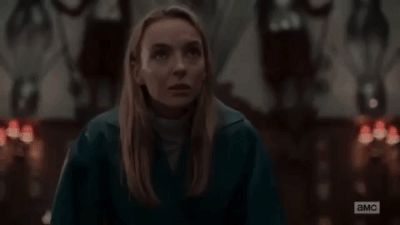
Rhian’s murder is a pivotal moment in Villanelle’s arc that fell into obscurity by jarring storytelling. Here the narrative seems to finally address the elephant in the room: when push comes to shove, can she control her violent impulses, which, no matter if inherited or cultivated, became a core part of herself? The ballroom tea dance effectively distances Villanelle from killing, but Villanelle and Rhian’s exchange show things aren’t so simple. More overtly so, Rhian and Villanelle subway brawl is all about giving Villanelle a chance to fully articulate the conflict around her subjugation to ‘The 12’ and her self-agency. Villanelle beats up Rhian, which could symbolically represent her refusal to be an obeying “sheep”; but, despite trying to get a grip of herself, her nature takes over and she kills, which could represent the uncontrollability of her impulse. Thus, the interaction between these two scenes, ballroom dance and Rhian’s kill create a conflict surrounding Villanelle’s nature, self-control and capability to change that goes beyond the central conflict of each scene alone. Interesting, better explore it late than never, right?
The next scene seems to give us the resolution of this conflict, as Villanelle exits the subway, marching forwards, defiantly looking at us while we hear “Nothing matters if you bury it deep” in the background. It sends a message that Villanelle ultimately embraced her nature, and perhaps herself, and by doing so symbolically broke free from the oppression, emerging victorious. One could say she found her mojo back by killing on her terms. However, this never has any effects on the character, Villanelle is still as conflicted about her self-identity and still expresses her desire stop killing when we meet her again in the final scene as if her march after killing Rhian never happened. so what was the writers trying to say with the Ryan’s kill sequence when, despite disconnecting and contradicting the previous and following scenes with Eve, it seems to have no effect on Villanelle herself? What narrative are the writers committing to?

Villanelle’s character arc: the faithful translation of a uncommitted vision
Villanelle’s character arc, not that it is her privilege, gets muddled by deliberate ambiguity, character isolation, confusing motivations, and overall disconnected narrative as the writers refuse to commit to a vision. Thus, set-ups, pay-offs, conflicts and cause-effect are muddled, devoiding the character development of tangible meaning or aim – nuanced or otherwise. Despite it all sort of working moment-to-moment, it’s hard to keep up with what is being established overall, the ever shifting and clashing elements making it impossible to crack these characters and their journeys. In threading the fine line between the said and the unsaid, Season 3 had its characters bottling up so much that we are alienated from them. Simply saying “something changed inside her, and she is facing lots of things” doesn’t mean anything. Having the character state that she doesn’t want to kill (be it in general or for ‘The 12′) only to have have your character still actively killing both for ‘The 12′ and for personal reasons and ignoring the conflict it creates, shows the character’s motivations don’t mean anything. Villanelle was in search for an authentic self-identity but in the end who is she? What was this journey all about? Honestly, fixing Villanelle to allow a romance no one really knows.
So my overall impression is that Villanelle’s character wasn’t lost in translation because there wasn’t any coherent vision behind it, but a succession of floating undecided moods and motivations tied together by powerful performances that leaves you feeling like Villanelle was redeemed. Thus, the audience - and arguably the cast and creators - are left relentlessly rationalizing Villanelle so the character doesn’t fall apart. Some see Villanelle truly in love, some see her as obsessing, some see her as emotionless, some see her as a pastiche, some see her as blossoming into her true self, some see her as two different characters (Oksana/Villanelle), some just think she cries a lot, some think she is remorseful, some think she isn’t, some believe she is a psychopath, some think she matured, some think she was never a psychopath and some think she is outright cured. No one fully grasped what is happening with Villanelle, not because her character is complex beyond comprehension but because her character remained conveniently inaccessible. Ultimately, Villanelle’s character growth is a mystery the show teased at but did not commit to crack.
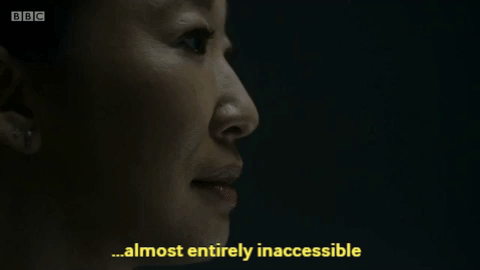
#killing eve#killingeve#killing eve review#killing eve analysis#killing eve season 3#killing eve s3#killingeveperspectives#ke#ke s3#villanelle#villanelle analysis#killing eve retcon#villanelle retcon
28 notes
·
View notes
Link
From the iconic films of drag legend Divine to the campy classics The Adventures of Priscilla, Queen of the Desert, and To Wong Foo, Thanks for Everything! Julie Newmar; the essential documentary Paris Is Burning to the groundbreaking TV series Pose; and, of course, the popular herstory-making franchise of RuPaul’s Drag Race. There’s a plethora of content from drag culture that can comfort the weary during these confusing times.
Drag, in its basic sense, is about transformation. It’s a reaction to society’s standards and expectations. However, albeit entertaining at first glance, drag, like any other art form, has always been political. From half a century ago’s queens of Stonewall riots to today’s digital queens, drag has always fought for the downtrodden – all the while wearing seven-inch rhinestone-studded heels.
In celebration of Pride Month, INQUIRER.net talked to six of the country’s fiercest queens about the importance of drag in this period of turmoil.
The art of drag
I always knew I like creating things, whether it’s dressing up our Christmas tree or dressing up for Halloween. When I first transformed in drag, it was like an epiphany. I knew this is something I would do for a long time. It was love at first drag…
As much as the pandemic has taken away the physical interaction that we used to enjoy during our parties, it also opened up more opportunities for the art of drag to be seen and appreciated. In the past, local drag queens and performers can only be seen inside nightclubs and LGBTQ establishments, and a lot of enthusiasts and artists don’t have access to such places, especially minors and those living in the provinces.
Nowadays, I still get to do drag, but more on hosting and co-producing online shows and parties. In doing so, I’m able to gather people and provide platforms for other drag artists to be seen and perform. So far, the reception has been good, especially since online e-numan is slowly becoming the new normal for our patrons in the clubs…
Drag is dynamic, evolving, and very diverse. Here in the Philippines, most people are familiar with drag through impersonators and our trans sisters donned in impeccable gowns. But there are also drag artists with occult or alternative aesthetics, or unpolished makeup skills, or garbage as part of their brand, and those who tell stories onstage that some may not like.
I, for one, am a storyteller. What I do is I incorporate current events or matters of public interest in the songs I perform. By carefully listening to the lyrics of a song, I weave its meaning to my stand on social issues. People may say it’s a political agenda, or that I’m biased or off-putting, but that’s what art does. It’s meant to provoke and challenge ideologies…
Human rights should never be a collateral damage. It is not the law itself that puts the people at risk. It’s the integrity and morality of those enforcing it that predisposes people to danger and makes them fear for their lives. Why would we trust such absolute power to this government?
-- Eva Le Queen
Mascots of the LGBT community
I started doing drag as an escape from reality. Just like any other art form, it’s a vehicle for the expression of my alter ego. My drag persona is an extension of who I am as a person.
I see it more as a hobby than work. I tell myself that I will stop doing drag once it starts to feel like work. During this pandemic, it’s so heartwarming to see all these queens, young and old, come together during these hard times…
There’s a Chicago drag queen named TRex who said, “As drag queens, we are the mascots of the LGBT community.” That resonated with me because we have a responsibility to amplify the voices of our community. Just because we’re entertainers doesn’t mean we don’t have a say on political issues.
In this country, those who criticize the government get silenced. That’s why as part of a community of outcasts in a society that conforms deeply to tradition, we make it a point to speak out without fear or reservations. Because at the end of the day, we have to be echoes that will remind our countrymen that we are the generation that never forgets…
It’s crazy. “I am the law.” That’s what’s happening in our country right now. It’s no longer about the law of the state. That’s why the Terror Bill is wrong. If the government can abuse the law against journalists who are only doing their job, they can surely do it to anyone.
The problem is, supporters of politicians act like fandoms. It shouldn’t be that way. They hold their positions because the people put them there. But, really, what can we expect from this government? You elect a clown, expect a circus.
-- ØV CÜNT
Disturbing the comfortable
Drag is a matter of creating your own reality, and in creating your identity, you get to choose the traits that you want to embody. I believe that it’s a melting pot of everything I’ve learned in life, especially from theater and the arts.
As drag queens, we get to break the social norms, and we do it with more power and confidence than we ever thought we had.
Drag is art, and art in general is meant to comfort the disturbed and disturb the comfortable. It’s a fun way of looking at what’s happening in our society and of doing checks and balances. Drag queens have always been integral in the LGBT movement, and removing politics from a drag queen is the same as removing that person’s identity…
Ever since the lockdown, more newbies have joined the scene, and they even get to perform with the more veteran queens. People aren’t that busy so we get to interact with each other. Queens from different clubs and cities finally get the chance to collaborate. Everyone gets a level playing field.
At the same time, it’s also challenging because it’s still a live show, so you still have to put in the effort. There’s no assurance of a talent fee, and the attention span of netizens is so short, especially with so many things competing for their attention online. It’s a different stage, too. We’re constricted to the screens of other people’s devices…
I always try to make my drag fun, but it depends on the mood, the sound, and the message. Same with crafting any other performance, there has to be a story. You should get the audience hooked and there has to be an escalation and climax. Whether you make it subtle or literal, the message always has to come across.
For me, the message is often about coming together as so-called deviants and telling people who we are and demanding what is ours, or telling people that we are not a sin and that being ourselves is good enough.
-- Mrs. Tan
Drag is unbreakable
I did drag for the first time by joining Drag Cartel back in November 2017. It’s a competition for aspiring drag queens. Category for the night was “Disney On Ice,” so I came as Prince Charming in drag. That night, I won, and from there, my love for drag just bloomed.
I do it because it makes me do things that I’d normally just fantasize about. It’s a realization of the things that give me inspiration. The look, the makeup, the attitude. Even though it takes a lot of time, effort, and money, and even though my face breaks out and I get physically hurt while performing, living that fantasy is still the best feeling…
“Keep drag alive” is what we always say, and that goes for togetherness. For drag queens, drag enthusiasts, and drag lovers to maximize the power of social media and uplift queer artists to keep pushing, and to show that this pandemic is not a reason to stop doing what you love…
Drag is a middle finger to all forms of hatred, homophobia, discrimination, social injustice, and stigma…
What’s going on in our country is so overwhelming that I’m often left speechless. Every day I scroll through my feed and I see one issue after another, and it makes me feel sick. I’m disgusted by the people responsible for all this mess.
I just hope people will take note of those in power who haven’t done anything good for this country. I hope that come election season, the people will remember what’s going on now and who’s responsible. I hope they vote for the right people. That’s all we can do as Filipinos.
—PRINCE
An image of hope
I started doing drag April of 2019 when I met a few drag queens (now my drag sisters and best friends) who helped me build my drag persona. I have always been very flamboyant and effeminate growing up, and drag opened up the possibilities for me to express those traits even further. Before, I was just doing it for self-discovery, but now, it’s for the community as well.
Drag is about finding the courage to create an image of hope and fulfilment for yourself that could later on affect other people’s lives…
The local scene has been very resilient when it comes to this pandemic. This is a living proof that drag is possible even without clubs and big venues. Just like wild grass, it’s bound to find a way to grow on its own no matter what…
Drag has always been political, and expressing my thoughts on socio-political issues through performances, public posts, online protests, and family and peer conversations is a way for me to maximize my drag as a political medium.
With everything that we’re facing right now, I think a lot of people are scared for their own safety more than ever. Aside from the unresolved coronavirus crisis, it’s really frightening to witness the recent displays of abuse of power and the questionable decisions of this government.
As a member of a community that has long been experiencing inequality, discrimination, and unlawful acts, I am deeply saddened with how all of this misconduct diminishes my hopes for a country free from oppression.
—Marina Summers
On the right side of history
Drag is my art, my craft, and my passion. Without it, I’m incomplete. It’s an alternative persona but it’s also part of my identity. It is the Juliet to my Romeo.
My interest in drag started after I saw the film To Wong Foo, Thanks for Everything! Julie Newmar. The glitz and glamour was so fascinating, and I immediately wanted to be part of that world.
People may see us as glamorous toads with a million rhinestones in 7-inch heels but, girl, it’s not as easy as it looks. Drag is not just crossdressing. It’s a transformation.
Drag queens are probably the most resilient and most creative people I know. Drag is thriving even on lockdown. There are a lot of online shows for all to see. We figured out a new way of showcasing our chops. We will survive this…
Drag is political. It was, it is, and it always will be. Periodt. I am a full-grown adult man dressed up to the nines, looking like Joan Crawford after losing the Oscars. It’s a big middle-finger to toxic masculinity and misogyny.
I like to think I have a considerable amount of following, which means I have a platform. I always have a choice, just like everybody else. One can choose to stay quiet, which effectively means choosing the side of the oppressors. Or I, a drag queen, can choose to be part of a positive change and help inspire a new generation of people who are not afraid to express themselves, political or otherwise.
I want to end on the right side of history. As a drag queen, I believe I can do that.
—Dee Dee Holliday
30 notes
·
View notes
Photo
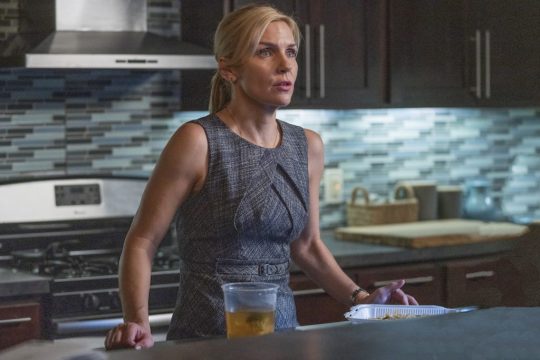
Rhea Seehorn: Who is Kim Wexler?
“I saw that something was eroding in Kim for multiple seasons.”
Awards Focus: In the season four finale, Kim was stunned when Jimmy revealed his emotional speech to get his law license reinstated was just a performance. She’s left standing in the hall as he races off to change his name to Saul Goodman.
This year, it’s Kim’s turn to leave Jimmy on his heels. Were you shocked when she left her work on Mesa Verde and subsequently started brainstorming about decimating Howard’s career to get Jimmy his Sandpiper case money?
Rhea Seehorn: Well, to be fair, it is a series of decisions. I saw that something was eroding in Kim for multiple seasons. And what I appreciate about our series, like Vince (Gilligan) and Peter (Gould) did with Breaking Bad, it’s about incremental decisions that these people are making. They’re unaware that they’re falling off a complete cliff. I didn’t know what that final scene was going to be. But I took every step that was handed to me with the information she had presently and played that scene.
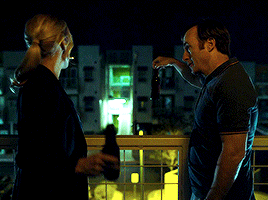
AF: You’ve said you’ve seen erosion going on in Kim, can you speak more to that?
Seehorn: The beauty of the show is that these characters are so affected by their past, not only by the events we’ve seen on the series but even before that. From the beginning of the series there was something about Kim’s stillness and her need for control and to right every ship. When I looked at that, I asked “What are you trying to get away from?” or “What are you suppressing that’s so chaotic that you need to make sure that everything is steady all the time?” Those questions spoke to me about the changes we’re seeing in the latter half of this season.
AF: So there’s a potential “Slippin’ Kimmy” underneath the Kim we’ve come to know?
Seehorn: About halfway through the season, Peter (Gould) said that he and the writers started thinking about the masks we all wear and what’s behind Kim’s mask. I will be very interested to see if she follows through with the decimation of Howard Hamlin and can she stomach those actions? Is she a person now who doesn’t even have a conscience? When she shoots the finger guns at Jimmy, there’s a menacing undertone that certainly concerns him.
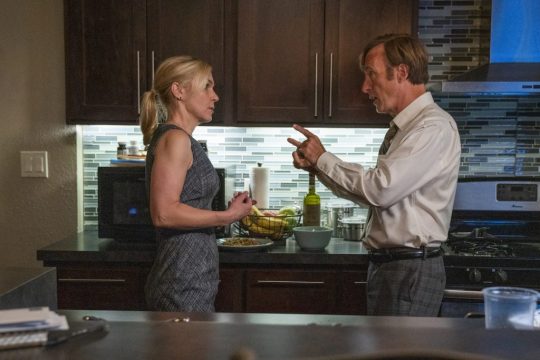
AF: There’s so many telling moments about Kim’s character. The moment when she and Jimmy are throwing the beer bottles off the roof, but Kim cleans up the glass the next morning. If Kim does goes through with this plan for Howard, do you think she would follow suit in some sort of attempt to clean up that mess as well?
Seehorn: That’s a good question. If Kim goes through with her plan, there may no way for Howard to recover. Michael Morris directed those beer bottle scenes, I love how they tie the episodes together. The first one where Kim had some animosity about her saying the name Saul Goodman and then when they’re tossing the bottles together it’s a bonding moment.
AF: Bob (Odenkirk) has spoken about living with Patrick (Fabian) and yourself in Albuquerque. Can you give our audience a look into the behind the scenes life during production?
Seehorn: The three of us have been living together for the last two years and prior to that Bob and Patrick lived together for a season without me. Frankly, I wish we’d been doing it the whole time. It’s so helpful because the scripts are so dense and complex and you’re always wishing you had more time to play with them and find new things.
AF: As you’ve pointed out, the scripts are often dense. When you have a dialogue heavy episode, how much of that preparation is just getting a grasp on the material?
Seehorn: A lot of it. Jonathan Banks and I laugh because we have the same philosophy. If you think you’re off book, then you need to ask yourself, “Are you off book riding a bike? Are you off book standing on your head? Are you off book swimming in the ocean?”
You think you know your lines and then as soon as you’re asked to do something, or you try blocking, or your scene partner decides to do whatever they’re going to do, the words start to slip away from you. There’s just no time for that with our shooting schedule, not if you want to bring your A-game.
AF: Is there a general time set aside for working through the scripts at the house?
Seehorn: If you’re having a cup of coffee in the main kitchen, you’re gonna get asked to read lines. You basically need to hide in your room if you don’t want to run lines, because if you are seen or visible anywhere in the house, you’re going to get asked. And we run lines that are not our scenes too. Like if Howard has a scene with someone else, then I’ll be whoever he’s talking to and it’s great.

AF: The scenes between Lalo (Tony Dalton) and Kim are incredible this season. Before we dive into specifics, talk about working with Tony and his presence as Lalo.
Seehorn: I mean, how great is Tony? What a find that Sherry Thomas and Sharon Bialy brought to Vince and Peter. He’s so talented, but he’s also a very generous actor. It doesn’t matter if he’s not talking for the majority of the episode nine confrontation, he’s giving me so much in that scene once I’m toe-to-toe with him.
AF: We saw a different Kim when she meets Lalo in jail. Can you talk about crafting that confrontation?
Seehorn: I spoke with Gordon Smith, who wrote episode eight, about the idea of when is Kim off her game? Because previously, we’d seen that she can fall apart in a stairwell or at home, but once she walks into a courtroom or a meeting, she suppresses all of that, and can be totally professional.
So, I went in there questioning “Do we think she can actually hold herself together right now?” We decided that she probably hasn’t slept at all and she knows this is a very scary situation. She’s pretty sure that Jimmy is dead or dying in the desert right now and she can’t call the police and tell them what happened. So, she’s trying to get information from Lalo and she’s unsuccessful in that scene whereas in episode nine she is successful.
I like that Kim got two attempts to go at Lalo using intelligence and rhetoric. The second one in episode nine, written and directed by Tom Schnauz, was a monster of a scene and we knew it.
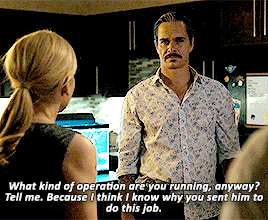
AF: What were some of the logistical considerations for the episode nine faceoff?
Seehorn: Tom came to Bob and Tony and I, and asked if we could rehearse it on set. It’s technically a difficult scene, I have the big monologue at the end, but Tony has to play a lot of different things as he’s reacting to what he’s hearing from Bob and then Kim.
For Bob, he has to repeat the same story but slightly differently, I think four times, which for an actor is very hard material to memorize because you lose track of where you are in the loop. Tom had written in purposeful nuances as Jimmy sort of devolves in his storytelling.
So we rehearsed it, and thankfully we made a lot of decisions with Marshall Adams (the director of photography) and our camera ops and lighting people. That allowed us to get ahead of the curve and give ourselves the hours that we had to shoot it instead of losing time on the technical aspects.
AF: At the beginning of that scene, you have to be very present for Bob and Tony, conveying that sense of dread and uncertainty that Kim feels. What’s going through her head there?
Seehorn: Kim is in survival mode for the first half of the scene. She’s very still, but she’s practical. I think she’s immediately thinking, “Could we jump from this balcony? Where are the knives in the house? Could Jimmy and I take him if we had to?” Eventually, she’s run out of options and is left with observing Jimmy and what unfolds in front of her.
AF: Kim knows that Jimmy is lying to Lalo and that Lalo either suspects it or knows it.
Seehorn: She knows there’s a secret involving the bullet hole in the mug, and that the secret is so great that Jimmy is literally crumbling in front of her and it needs to be protected at all cost for some reason.
AF: And then Kim steps up to the plate, which was the most harrowing moment of the season. Were you always meant to get so close to Tony, having Kim invade Lalo’s space like that?
Seehorn: Yeah, that was in the script. I spoke to Jennifer Bryan, who’s brilliant with our costumes, and I said, “Kim’s coming from work so she has her heels on… do you think we can get the shoes off in the scene?” I talked to Tom Schnauz about having Kim’s shoes off because I wanted to be even physically smaller than Lalo.
Kim switches to pragmatism in that moment, that’s her fight or flight. She wants to go toe-to-toe like she’s proving a case, finding the holes in Lalo’s story and sewing enough doubt that he backs down.
AF: Do you think Kim prepared her argument while she was sitting there, listening to Jimmy?
Seehorn: I talked to Tom about that, I don’t think she memorized this monologue while she was sitting there on the couch worried. I think she starts it and has to find it. So, we made sure we did a couple of runs at that, just letting me find it and letting me constantly control that lump in my throat because Kim can’t become hysterical.
If Lalo sees that she’s emotionally terrified or starts screaming or anything like, she loses all she has, which is trying to present a logical, forceful argument that he really has to consider. You see Lalo shush Kim earlier on the scene, so I think she’s pretty clear what the cartel would think of women screaming or crying.
AF: Prior to Lalo, Kim’s biggest confrontation was with Mesa Verde client Kevin Wachtell (Rex Linn). The property tycoon was locking horns with Mr. Acker (Barry Corbin), an elderly home owner who refused to vacate his property.
Kim, feeling sympathetic to the man’s circumstances, recruits Jimmy to represent him — a move that nearly causes their relationship to implode. I don’t think anyone saw the idea for marriage coming, much less from Kim. What was your reaction to that?
Seehorn: That was something Bob and I worked extensively on, getting that moment to feel authentic. It’s also Kim accepting Jimmy for who he is, rough edges and all. In episode nine, Jimmy can’t accept Kim’s decision to quit Mesa Verde and she calls him out on it.
AF: Knowing what we know from Breaking Bad and now El Camino, there are very few living characters in the Gene timeline that could give fans a meaningful, full-circle conversation as the series closes. Would you agree with the argument that Kim is the obvious choice for the final conversation with the Gene?
Seehorn: Honestly, I didn’t know I’d be alive this long. If I attempt to take myself out of the equation, which is super hard as an actor, I think the writers are always going to reach for the smartest ending.
Is it the most satisfying storytelling with Kim there at the end? Or is it not? I do agree with you that as a fan I want some resolution regarding Gene. Will we only get one more scene at the beginning of season six, or will it be expanded throughout that season? There’s another question for you.
Part of AwardsFocus.com’s BCS interviews [x]
10 notes
·
View notes
Text
Growing Pains: The Characters
No matter what medium, characters are an integral part of storytelling. Whether it’s a book, stage play, movie, or a television show, the audience will likely not stick with it if they should happen to think the Eight Deadly Words:
“I don’t care what happens to these people.”
While it’s important to develop good characters in every form of storytelling, it is perhaps the most crucial to get them right on television.
While a film can distract from it’s lackluster characters with interesting visuals, a fast-paced storyline, and some neat twists and setpieces, television rarely has that luxury. Produced with a smaller runtime, on a smaller budget, television episodes tend to be character-based. With the exception of anthologies, most television shows have a set number of cast members that the audience follows through multiple episodes. This means that the characters in shows must be versatile enough to be interesting in multiple stories, and multiple types of stories, and be able to grow and change at a slow, but steady, rate. As a result, writing for characters on television can be hard.

Even when the said characters are a family from a Domestic Sitcom.
Like I said, characters are a vital ingredient in television. They are the people that we come back to every week, and often, they are the reason we keep watching. The characters make or break a television show, and as such, it’s incredibly important to create a main cast that the audience enjoys spending time with.
Luckily, the way to do it isn’t as hard as it might seem.
I’ve mentioned before that the secret to creating main characters (especially for television) is to mix two components: relatability and entertainment.
As with all fiction, television is an exaggerated version of reality. Even the slice-of-life sitcom scenarios have to be a little bigger, a little more extreme than our normal lives in order to be entertainment. But the audience tends not to buy it unless there’s that dose of reality, that relatability within the stories and characters in that we can see ourselves reacting in similar ways, or recognize elements in our own lives. This is true of writing for plots, but it’s also true of writing for characters.
Which brings us to our question:
Are the Seavers good television protagonists?
What a great question, I’m so glad I asked! Let’s take a look.

The Seavers are, to some degree, a family that any of us might know, or in some ways, be. They fight, make up, grow and learn as much as any family does, and as such, the audience identifies with their dynamic. They react to events, not as a unit, but as individuals within a family unit, and their separate personalities and interactions with one another make for engaging stories and development.
But, like I said, they are individuals, not a unit, and we have to look at them as such, starting with the patriarch of the family: Jason Seaver.

Jason is a psychiatrist, a dad, and a Reasonable Authority Figure. While not infallible, Jason does whatever he can to be fair with his kids, and, being exposed to them often, combined with his practice gives him an edge on knowing how to get them to behave. He’s interested in knowing the roots of the behaviors, and tries very hard to understand his family. He’s more likely to concoct an ‘outside the box’ method to reign in his kids, but he’s always respectful of their feelings, and tries to bring the family together. He is the heart, ready to take charge when necessary.
Of course, being a ‘grown-up’ does not automatically make him a complete person. Jason also grows and learns throughout the series, and comes with struggles of his own. There are plenty of episodes where he deals with decisions like whether to go back to work, or stay at home to support his wife’s career, or is forced to contend with things like his mother’s second marriage. As such, he’s a relatable character, more than just ‘The Dad’, but a person in his own right. This element is shared by his wife, Maggie Seaver.
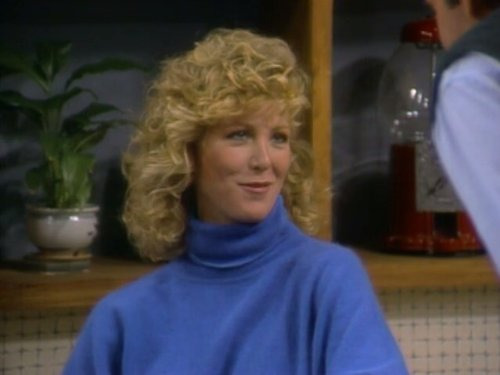
Maggie is a reporter, a mom, and, surprisingly, another Reasonable Authority Figure. Again, not infallible, but in a different way than her husband. Maggie is a little more prone to laughing at her family’s antics, and being a little more quick to jump to action than Jason’s “Wait for the teachable moment” strategies. She’s more of the disciplinarian between the two, a devoted career woman, and is on the more cautious side.
She has her share of problems too, such as dealing with an unexpected pregnancy, harassment in the workplace, and her father’s death. Again, she is more than ‘The Mom’, and continues to grow throughout the series. She’s a more rounded character, a person for the audience to relate to.
Perhaps the most interesting thing about the parents on the show is how they work together and interact. As it turns out, the show was originally going to be more focused on the parents, until Mike turned into the Breakout Character of the show. The ‘grown ups’ don’t always agree, and approach parenting in different ways, but they endeavor to work together as a team, with a genuine relationship. Sometimes they fight, but they are typically supportive of one another, and handle problems in a mature way that tends to more closely reflect real life rather than other ‘zany’ revenge or ‘lesson teaching’ plotlines of other Dom-Coms. They do genuinely want what’s best for their kids, and the audience gets to watch them watch their family grow up and expand in a way that’s resonant with how real parents deal with their own families.
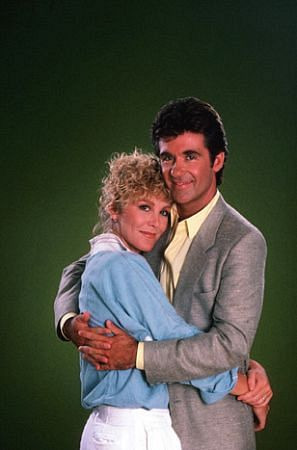
As a result, Jason and Maggie work well as sitcom protagonists, being different enough from each other to spark conflict and struggle, but affectionate and loving enough to patch it up before it gets too ugly. Their relationship comes across as genuine, and they grow enough as individuals that it’s satisfying to watch them throughout all seven seasons of the show.
But, of course, there’s a lot more to the Seavers than the parents. Let’s talk about the kids.
We have to start with Mike.
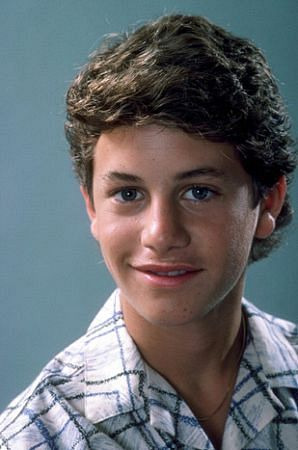
The oldest kid and the Breakout Character (similar to Michael J. Fox’s character, Alex P. Keaton, on Family Ties, except a polar opposite personality), Mike Seaver is most parents’ mildly annoying nightmare. Not bad enough to be a ‘bad kid’, but nowheres near good, Mike was a middle-of-the-road teenager. He got into trouble, came home after curfew, lied, attempted to cheat, and was overall, kind of a self-centered brat early on, but he typically knew where to draw the line (see the drug episode, “Thank God it’s Friday”), and didn’t get away with the bad things that he did do.
As time went on, Mike grew up and out of a lot of his problematic behavior, becoming more responsible and mature. (Some of that was affected by actor Kirk Cameron’s conversion to Christianity during the show.) Even early on, there were signs that Mike not be so much of a troublemaker, where he did show a hidden heart of gold underneath the cocky, snarky exterior. Typically the funny-man of the kids, Mike was always ready with a quick-witted joke, (usually at someone else’s expense, especially his siblings) which made him a fan-favorite early on. The show is an excellent showcase of his development from problem-child to responsible adult, getting a job and moving out. But he wasn’t the only one of the kids to change.
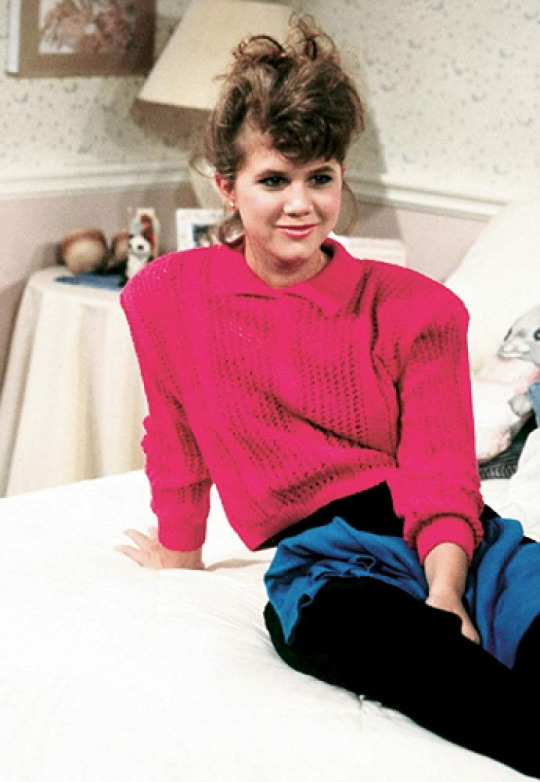
Carol, second oldest, was the brain of the family, and she knew it. Bright, studious, hardworking, and just as much a Deadpan Snarker as Mike, Carol was typically the Only Sane Man of the kids, the most likely to realize when something was a bad idea. Occasionally suffering from self-esteem problems (being ‘nerdy’ in the 1980s was akin to having the Black Plague, according to teen media), Carol was more cautiously adventurous than her brothers, wanting to see the world and learn as much as she could.
She too grew up. Throughout the series, Carol learned that academics wasn’t everything, and grew into a more rounded individual, taking risks, exploring, and becoming a responsible adult, changing through experiences both good and bad. Occasionally self-righteous, sensitive, and intelligent, Carol was a fine, and relatively realistic example of the high-school smart-kid in the real world.
That leaves only Ben, the youngest.
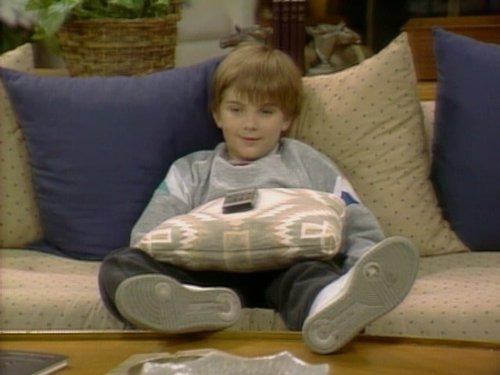
From a young age, Ben was rowdy, rambunctious, rascally, and (I’m almost out of R words, help) a royal pain to his siblings. Initially rather gullible and apparently insistent on taking lessons the wrong way, the trouble Ben got into in the beginning was mostly due to the fact that he was just naive (Inviting a homeless kid in for Christmas Eve, calling a porn hotline repeatedly, etc.), but as time went on, Ben became more of a problem than Mike had been, getting himself into bigger trouble. As the youngest and the most perpetually childish, more and more lessons were milked out of Ben than any of the other siblings, and as such, he had to screw up more than they did.
He got more than his share of focus episodes too. Episodes like “Birth of a Seaver” included large subplots where Ben had his own big moments, dealing with the death of a stranger, and then the new life of a family member, in a rather interesting way. Other episodes focused more on his learning hard truths, such as the unfortunately accurate Aesop: Sometimes, cheaters prosper, but honesty is better for the long run.
It’s difficult to say that the kids ‘got along’, because for the most part, they didn’t. They fought, squabbled, tattled, and got each other into trouble quite often. By the same token, they also knew when to help each other.
Like I said earlier, the one thing you can say about the Seavers is that they felt absolutely genuine. They deconstructed character types and sitcom plots regularly, and the family’s interactions felt real. They weren’t totally saccharine, and they weren’t unbelievably nasty to one another either. They were different from one another, (different enough to get different stories out of them for seven years) but came together when they needed it. At the end of the day, despite the personality conflicts, disobedient kids, and unfortunate events, the Seavers loved each other, and felt like a family.

And that’s what made the show really work.
The characters had to grow and change, albeit slowly, because that’s how life works. Growing Pains was a sitcom depicting exaggerated family life, and as such, the characters had to be memorable, as well as learn and grow. By the end of the show, these are not the same people that we started out with. Out of necessity, they had to grow up. And that’s a good thing.
Thanks to the familiar format and personalities, the audience enjoyed tuning in every week to watch and laugh along with a family that we related to, that we understood. Almost everyone can find at least a part of themselves in at least one character, and we recognize the interactions in our own lives and families.

In the end, the Seavers are good sitcom protagonists, because they hit that combination of entertainment and relatability nearly perfectly, with just the right consistency to tell stories full of heart, comedy, and tragedy, and to make it work for seven years. They felt real, and after all, that’s the point of good characters.
Thank you guys so much for reading! Join us next time as we discuss Growing Pains and the culture. If you have anything you’d like to say, don’t forget to leave an ask! I hope to see you all in the next article.
#Television#TV#TV-G#Growing Pains#80s#Comedy#Family#Alan Thicke#Joanna Kerns#Kirk Cameron#Tracey Gold#Jeremy Miller
2 notes
·
View notes
Text
Stargirl: How Cindy Burman Became the Most Intriguing DC TV Villain
https://ift.tt/2ZMmxp2
This article contains Stargirl spoilers.
Stargirl is the sort of superhero show that has no right to be as good as it is. A story about a teenager discovering a glowing, sentient staff and fighting supervillains with names like “The Gambler” in a costume that’s little more than a midriff-baring Captain America rip-off should, in all honesty, be a joke. Therefore, the fact that it’s actually one the best DC television series currently on the air may come as a surprise to many, but this little show has proven over the course of its first season that there’s basically nothing it can’t do.
A perfect mix of heartfelt optimism and deep cut fan service, Stargirl soars because it trusts both its characters and its audience. This is a show that encourages its viewers to embrace complexity and to hold often competing concepts together in the same moment for maximum narrative impact. Stargirl itself exists in a similar duality, a show with a classic comic book feel and bright tone, but whose youthful verve and risky storytelling points the way to the exciting and different things this genre is still capable of doing.
And there’s no better example of this than Cindy Burman, who is simultaneously a monster and a horribly lost teenage girl.
When we first meet Blue Valley High HBIC Cindy she appears to be little more than your average mean girl. A less interesting Cheryl Blossom-type, her only goal seems to be to make herself the center of attention at all times, whether that means sabotaging another student’s election as class president, winning the school talent contest with subversive-for-Nebraska dance moves or simply being rude to new students. Entertaining, yes – but probably not that important to the overall story that Stargirl was telling.
This is an assumption that turns out to be the furthest thing from the truth.
Because Cindy is a character – much like Stargirl itself – that’s much more complex and nuanced then she appears at first glance. The DC TV universe’s first teen supervillain, Cindy is vicious, dark, and deadly by turns. Yet, even as Stargirl acknowledges her evil nature, it also takes pains to make sure she remains at least somewhat relatable, allowing Cindy to occupy an intriguing liminal space within the narrative. She’s a teenager who knows too much to enjoy her status as a high school queen bee, but who is still seen as too young to have a proper seat at the Injustice Society’s table. She’s both the Dragon King’s daughter and someone who was likely one of his very first victims. And she’s both determined not to need anyone, and miserably lonely at the same time.
In the “Shiv” two-parter that essentially serves as Cindy’s origin story, we see a girl who is condescending and cruel, but who also desperately wants to find someone who can understand what she’s going through. She repeatedly tells her father how frustrated she is by being “all alone up there” in the world of Blue Valley, forced to date a boy that she doesn’t even like that much in order to monitor him for the Injustice Society and unable to tell the truth about herself to any of her supposed friends. The Dragon King – like so many fathers of teens before him, supervillain or no – refuses to see her for who she is, offhandedly recommending she fix her problems by going shopping or throwing another party.
Read more
TV
Stargirl Season Finale Ending Explained and Unanswered Questions
By Rosie Knight
Both the show and actress Meg DeLacy do a great job making Cindy sympathetic without undermining or trying to justify just how truly terrible she is. She’s a girl who hides deep insecurities behind a performative bitchy persona, but who also has no problem casually murdering her father’s brainwashed lackeys (for what is apparently not even close to the first time). It certainly makes sense that Cindy might be drawn to Courtney Whitmore, a new girl with a forthright attitude and little respect for the established way things work in Blue Valley. Who better, after all, to truly see you than someone who doesn’t know you at all?
It would be easy for Stargirl to insist that Cindy and Courtney are destined to be enemies because Starman and Dragon King were, their vendettas predetermined long before these girls even knew who the other was. But like so many other tropes this series has tackled this season, the show isn’t content with anything so basic. Instead, when it pulls out the traditional “we’re not so different, you and I” speech that often passes between a hero and a villain, the conversation lands differently – because Stargirl has taken the time to show us long before this moment that it’s a cliché that’s actually mostly true in this case.
In a different world, it’s pretty easy to imagine how these girls could have ended up in each other’s places, through accidents of birth or circumstance. In this one, it’s still not completely outside the realm of possibility to envision them as a sort of uneasy frenemies at some point in the (distant) future.. The Cindy who visits Courtney’s bedroom to taunt her and threaten her friends is also there because she’s literally never had anyone she could talk to about this whole superhero and/or supervillain lifestyle before, and that’s a true gamechanger for her.
Stargirl has already hinted there’s still more to Cindy than we viewers know. According to Beth, she used to be nice before her mother died, and it wasn’t until afterward that she became the “scariest kid in fourth grade”. Given that the show has repeatedly hinted that she somehow caused her mother’s death, that seems as though it’s probably when her father started experimenting on her, and we’ve yet to truly see the extent of how that’s affected her.
Yet, despite the Dragon King’s repeated abusive and cruel behavior, Cindy remains convinced her father loves her. She even still covets his good opinion – or, at least, she does right up until the moment she stabs him through the chest. Much like everything else involving this character, CIndy’s murder of her father is a complicated decision, an act that appears to be as driven by pain as much as it is by fury.
Read more
TV
Stargirl: What is Eclipso?
By Rosie Knight
(No matter how messed up she is, hearing that her father – and all his supervillain friends – considered her a failed experiment has to hurt.)
And though Cindy doubtless mourns her father in her own way (if he’s even actually dead for real), she’s also eager to establish herself in his place as the new de facto head of the next generation of the Injustice Society. Though Cindy is knocked out by Courtney during the battle in the season finale, we see her retrieve a jewel from what is presumably her father’s vast archive of unlabeled evil materials.
Before the screen goes dark, she addresses it as “Eclipso,” indicating that she’s well on her way to building her own version of the Injustice Society (surely Cameron Mahkent or Isaiah Bowin might have some legacy anger issues to work out next season?). But what that will ultimately look like is anyone’s guess – particularly since this show has already proven that it’s both willing and eager to take the road less traveled, narratively speaking.
Will Stargirl and Shiv somehow become besties who do one another’s nails and have sleepovers? Probably not. But that doesn’t mean that there’s no room for something else between them, either. Particularly since they’ve both moved out from under the shadows of the men they once called their fathers and are forging their own paths.
After all, Stargirl is a show that’s strengthened by the familiar ground of comic book clichés, rather than weakened by them – and all because it doesn’t count on vague tropes to do its heavy narrative lifting. Instead, it leans into these familiar aspects, sharpening their edges and allowing the familiar bones of old stories to light our path to new ones.
The post Stargirl: How Cindy Burman Became the Most Intriguing DC TV Villain appeared first on Den of Geek.
from Den of Geek https://ift.tt/3kD6F1t
4 notes
·
View notes